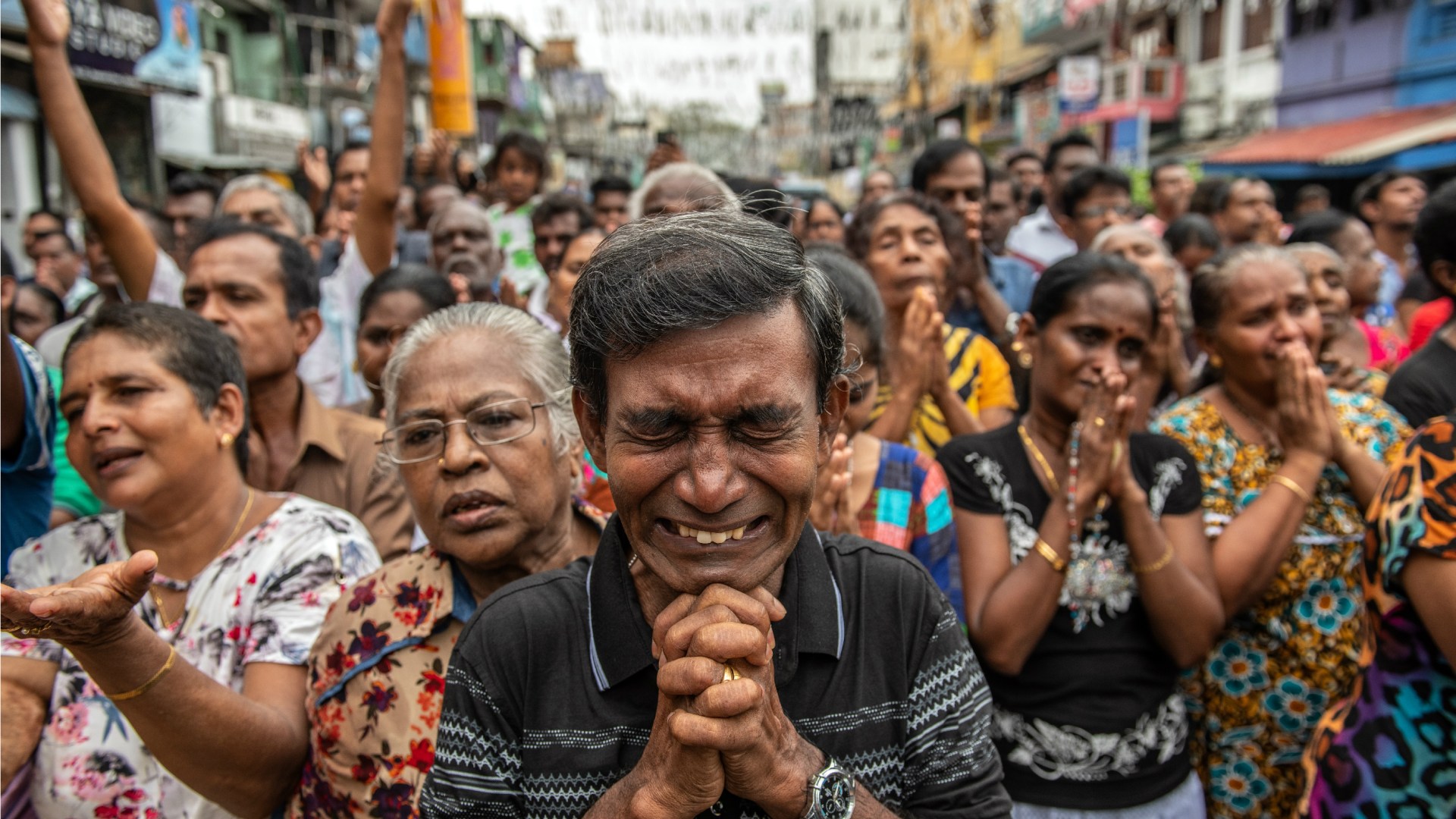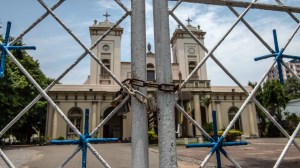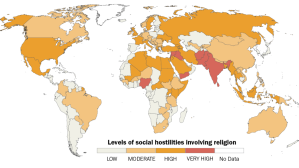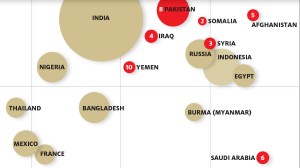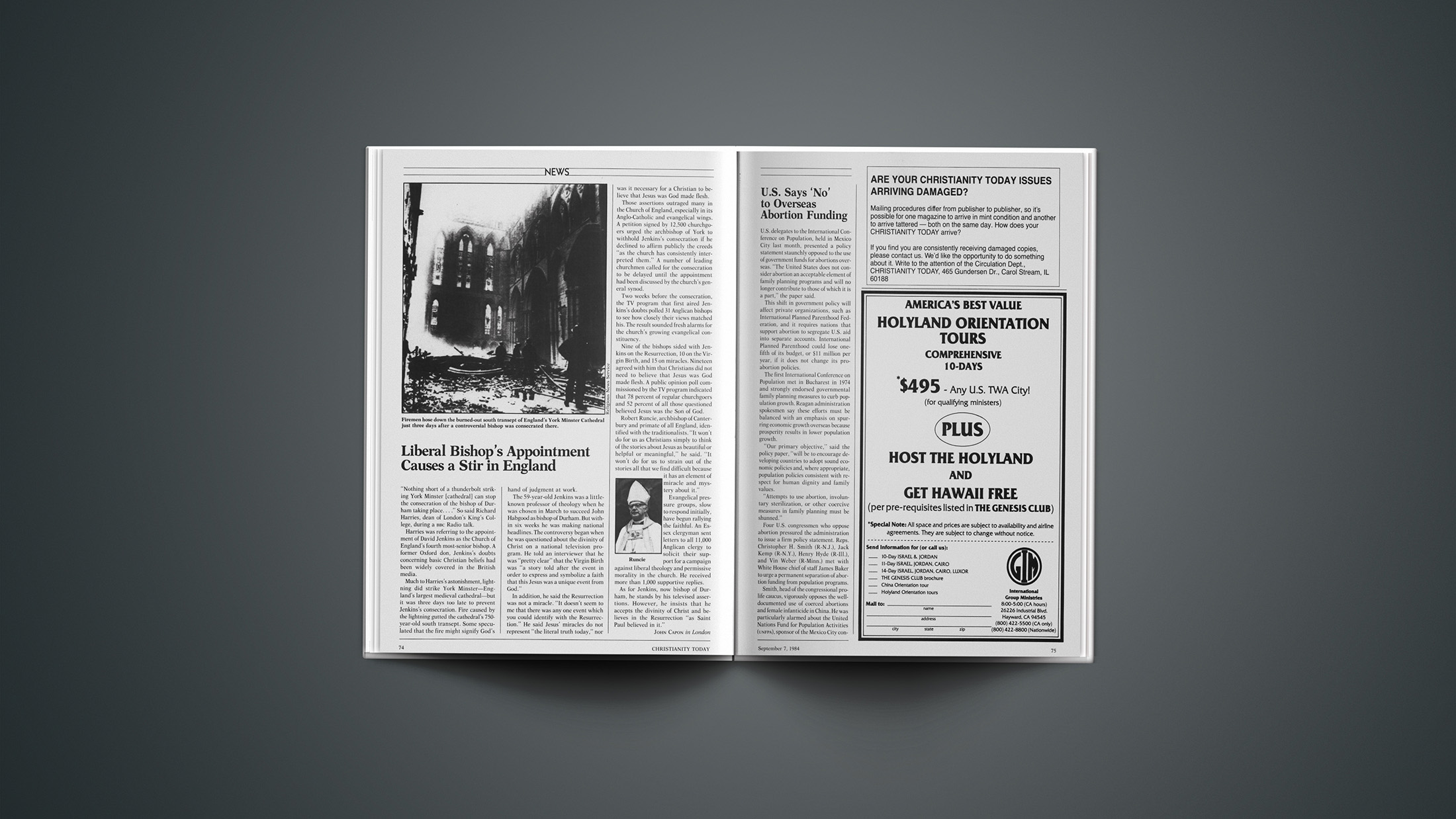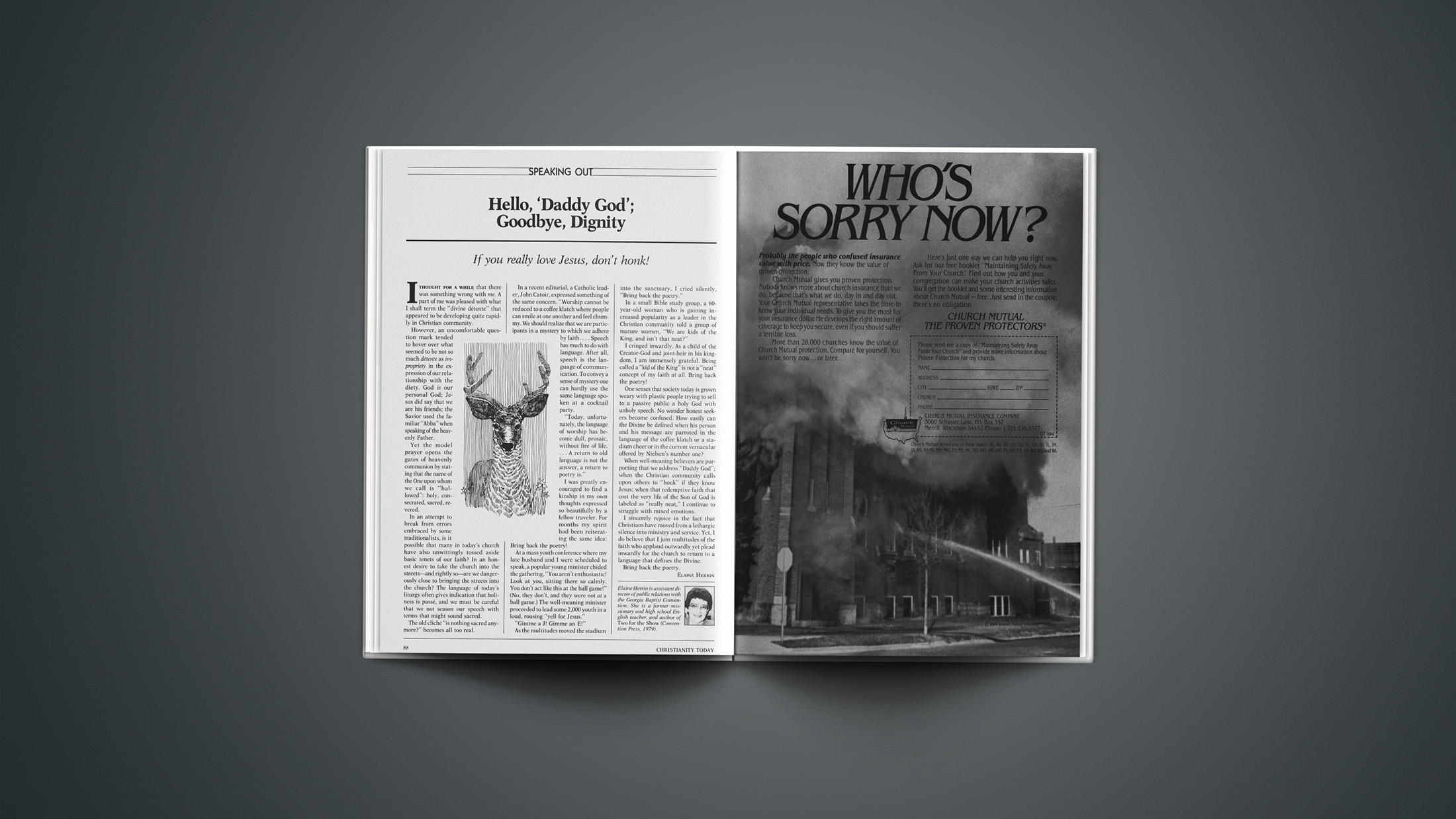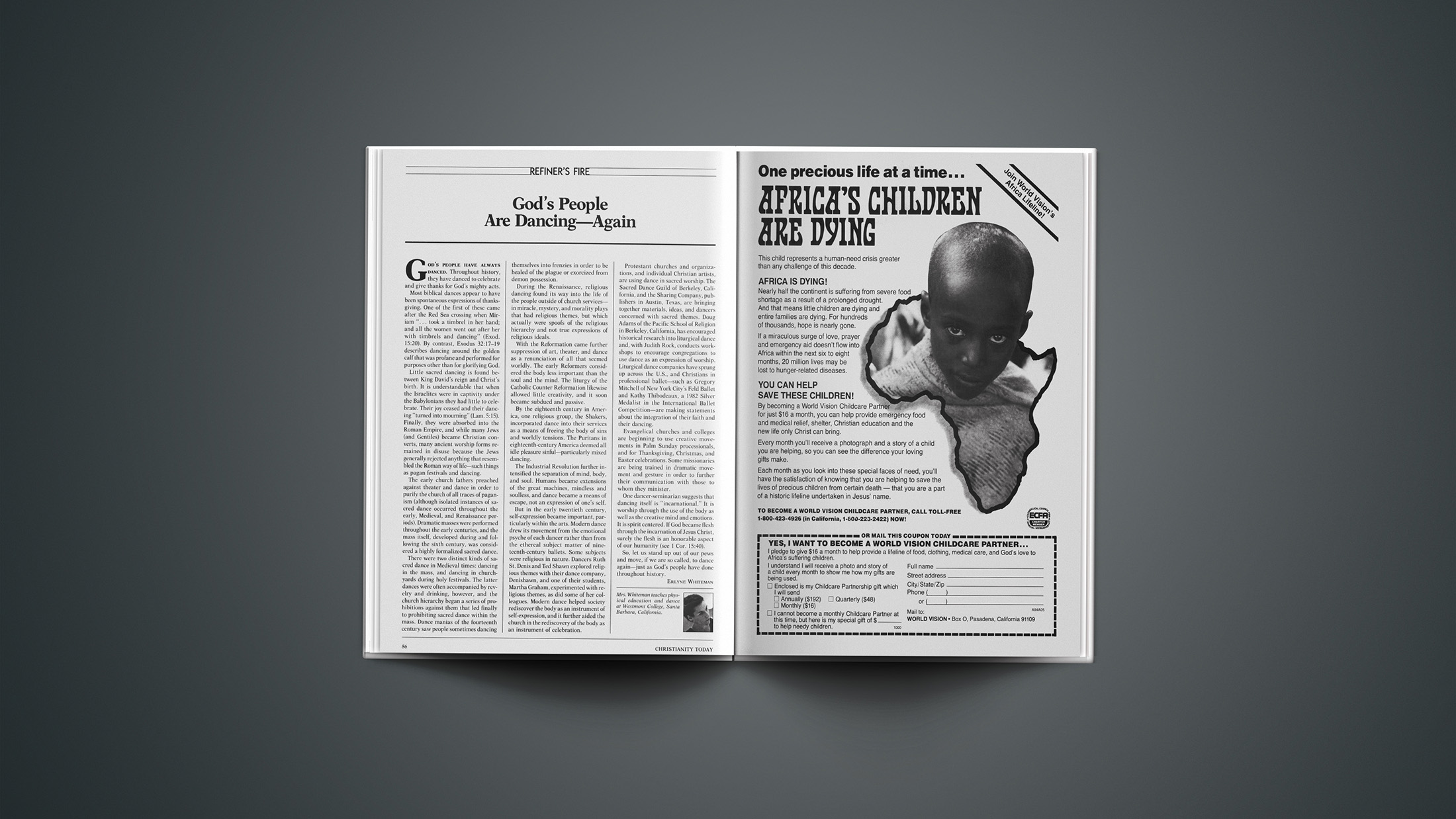In this series
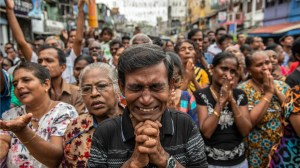
Government restrictions on religion are at a global high.
Social hostility toward religion, however, is at its lowest level worldwide since ISIS.
So says data analyzed by the Pew Research Center in its 12th annual measurement of the extent to which 198 nations and territories—and their citizens—impinge on religious belief and practice.
The 2021 report, released today, draws primarily from more than a dozen UN, US, European, and civil society sources, and reflects pre-pandemic conditions from 2019, the latest year with available data.
Matching a peak from 2012, 57 nations (29%) record “very high” or “high” levels of government restrictions—an uptick of one nation from 2018. The global median on Pew’s 10-point scale held steady at 2.9, after a steady rise since the baseline of 1.8 in 2007, the report’s first year measured.
Regional differences are apparent: The Middle East and North Africa scored 6.0; Asia-Pacific scored 4.1; Europe scored 2.9; Sub-Saharan Africa scored 2.6; and the Americas scored 2.0.
But across the globe, restrictions are present.
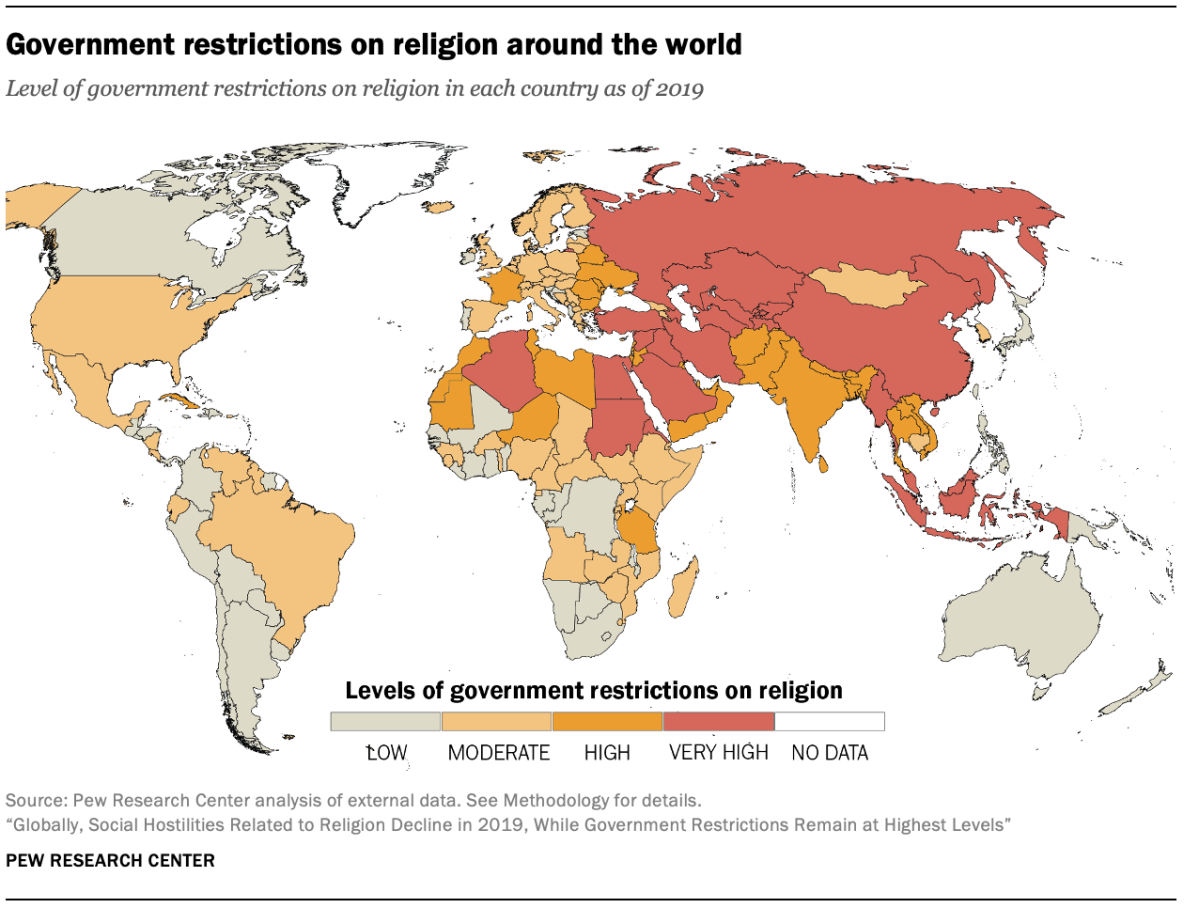
Most common, according to Pew, is “government harassment of religious groups.” More than 9 in 10 nations (180 total) tallied at least one incident. Also common is “government interference in worship.” More than 8 in 10 nations (163 total) recorded incidents.
And nearly half (48%) of all nations used force against religious groups. China, Myanmar (formerly known as Burma), Sudan, and Syria tallied over 10,000 incidents each.
For example, Pew noted: “Renewed fighting between the military and armed ethnic organizations in the [Myanmar] states of Kachin and northern Shan ‘deeply impacted’ Christians, according to USCIRF. In 2019, thousands were displaced—including many Christians—in addition to more than 120,000 Rohingya who already had been internally displaced, and the military damaged over 300 churches.”
While increases were noted in the above categories, the overall median score stayed level due to decreases in two categories. Fewer countries had limits on proselytizing and on foreign missionaries (on both metrics, 77 nations in 2019, down from 81 in 2018). And there were fewer reports of countries denouncing religious groups as “cults” or “sects” (26 nations in 2019, down from 30 in 2018).
The number of nations recording “very high” scores also decreased, from 26 to 23, matching the lowest total since 2015. Kyrgyzstan and Sudan were added to the ranks of the “very high,” while Mauritania, Morocco, Vietnam, Western Sahara, and Yemen scored lower this year.
Overall, all but 14 nations scored about the same as the prior year. “Modest” increases of 1.0 or more were recorded in six countries, while eight declined similarly. No nations registered a “large” variance of 2.0 or more in their score.
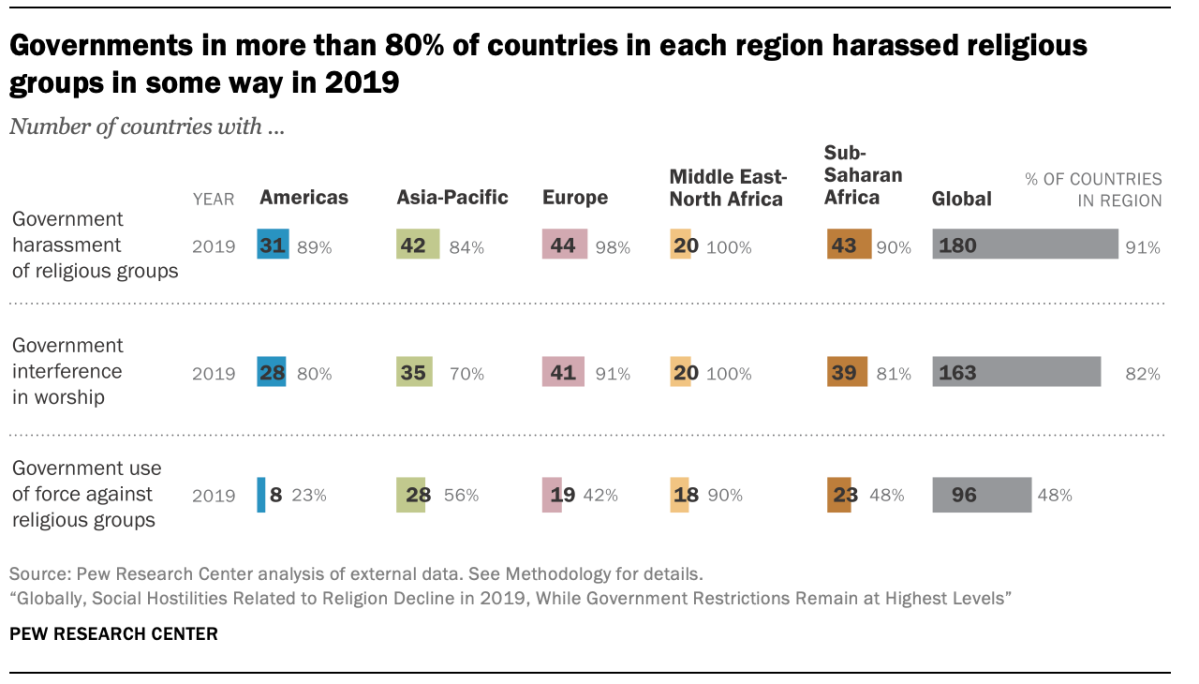 If you really love Jesus, don’t honk!I thought for a while that there was something wrong with me. A part of me was pleased with what I shall term the “divine détente” that appeared to be developing quite rapidly in Christian community.However, an uncomfortable question mark tended to hover over what seemed to be not so much détente as impropriety in the expression of our relationship with the diety. God is our personal God; Jesus did say that we are his friends; the Savior used the familiar “Abba” when speaking of the heavenly Father.Yet the model prayer opens the gates of heavenly communion by stating that the name of the One upon whom we call is “hallowed”: holy, consecrated, sacred, revered.In an attempt to break from errors embraced by some traditionalists, is it possible that many in today’s church have also unwittingly tossed aside basic tenets of our faith? In an honest desire to take the church into the streets—and rightly so—are we dangerously close to bringing the streets into the church? The language of today’s liturgy often gives indication that holiness is passé, and we must be careful that we not season our speech with terms that might sound sacred.The old cliché “is nothing sacred anymore?” becomes all too real.In a recent editorial, a Catholic leader, John Catoir, expressed something of the same concern. “Worship cannot be reduced to a coffee klatch where people can smile at one another and feel chummy. We should realize that we are participants in a mystery to which we adhere by faith.… Speech has much to do with language. After all, speech is the language of communication. To convey a sense of mystery one can hardly use the same language spoken at a cocktail party.“Today, unfortunately, the language of worship has become dull, prosaic, without fire of life.… A return to old language is not the answer, a return to poetry is.”I was greatly encouraged to find a kinship in my own thoughts expressed so beautifully by a fellow traveler. For months my spirit had been reiterating the same idea: Bring back the poetry!At a mass youth conference where my late husband and I were scheduled to speak, a popular young minister chided the gathering, “You aren’t enthusiastic! Look at you, sitting there so calmly. You don’t act like this at the ball game!” (No, they don’t, and they were not at a ball game.) The well-meaning minister proceeded to lead some 2,000 youth in a loud, rousing “yell for Jesus.”“Gimme a J! Gimme an E!”As the multitudes moved the stadium into the sanctuary, I cried silently, “Bring back the poetry.”In a small Bible study group, a 60-year-old woman who is gaining increased popularity as a leader in the Christian community told a group of mature women, “We are kids of the King, and isn’t that neat?”I cringed inwardly. As a child of the Creator-God and joint-heir in his kingdom, I am immensely grateful. Being called a “kid of the King” is not a “neat” concept of my faith at all. Bring back the poetry!One senses that society today is grown weary with plastic people trying to sell to a passive public a holy God with unholy speech. No wonder honest seekers become confused. How easily can the Divine be defined when his person and his message are parroted in the language of the coffee klatch or a stadium cheer or in the current vernacular offered by Nielsen’s number one?When well-meaning believers are purporting that we address “Daddy God”; when the Christian community calls upon others to “honk” if they know Jesus; when that redemptive faith that cost the very life of the Son of God is labeled as “really neat,” I continue to struggle with mixed emotions.I sincerely rejoice in the fact that Christians have moved from a lethargic silence into ministry and service. Yet, I do believe that I join multitudes of the faith who applaud outwardly yet plead inwardly for the church to return to a language that defines the Divine.Bring back the poetry.Elaine Herrin is assistant director of public relations with the Georgia Baptist Convention. She is a former missionary and high school English teacher, and author of Two for the Show (Convention Press, 1979).
If you really love Jesus, don’t honk!I thought for a while that there was something wrong with me. A part of me was pleased with what I shall term the “divine détente” that appeared to be developing quite rapidly in Christian community.However, an uncomfortable question mark tended to hover over what seemed to be not so much détente as impropriety in the expression of our relationship with the diety. God is our personal God; Jesus did say that we are his friends; the Savior used the familiar “Abba” when speaking of the heavenly Father.Yet the model prayer opens the gates of heavenly communion by stating that the name of the One upon whom we call is “hallowed”: holy, consecrated, sacred, revered.In an attempt to break from errors embraced by some traditionalists, is it possible that many in today’s church have also unwittingly tossed aside basic tenets of our faith? In an honest desire to take the church into the streets—and rightly so—are we dangerously close to bringing the streets into the church? The language of today’s liturgy often gives indication that holiness is passé, and we must be careful that we not season our speech with terms that might sound sacred.The old cliché “is nothing sacred anymore?” becomes all too real.In a recent editorial, a Catholic leader, John Catoir, expressed something of the same concern. “Worship cannot be reduced to a coffee klatch where people can smile at one another and feel chummy. We should realize that we are participants in a mystery to which we adhere by faith.… Speech has much to do with language. After all, speech is the language of communication. To convey a sense of mystery one can hardly use the same language spoken at a cocktail party.“Today, unfortunately, the language of worship has become dull, prosaic, without fire of life.… A return to old language is not the answer, a return to poetry is.”I was greatly encouraged to find a kinship in my own thoughts expressed so beautifully by a fellow traveler. For months my spirit had been reiterating the same idea: Bring back the poetry!At a mass youth conference where my late husband and I were scheduled to speak, a popular young minister chided the gathering, “You aren’t enthusiastic! Look at you, sitting there so calmly. You don’t act like this at the ball game!” (No, they don’t, and they were not at a ball game.) The well-meaning minister proceeded to lead some 2,000 youth in a loud, rousing “yell for Jesus.”“Gimme a J! Gimme an E!”As the multitudes moved the stadium into the sanctuary, I cried silently, “Bring back the poetry.”In a small Bible study group, a 60-year-old woman who is gaining increased popularity as a leader in the Christian community told a group of mature women, “We are kids of the King, and isn’t that neat?”I cringed inwardly. As a child of the Creator-God and joint-heir in his kingdom, I am immensely grateful. Being called a “kid of the King” is not a “neat” concept of my faith at all. Bring back the poetry!One senses that society today is grown weary with plastic people trying to sell to a passive public a holy God with unholy speech. No wonder honest seekers become confused. How easily can the Divine be defined when his person and his message are parroted in the language of the coffee klatch or a stadium cheer or in the current vernacular offered by Nielsen’s number one?When well-meaning believers are purporting that we address “Daddy God”; when the Christian community calls upon others to “honk” if they know Jesus; when that redemptive faith that cost the very life of the Son of God is labeled as “really neat,” I continue to struggle with mixed emotions.I sincerely rejoice in the fact that Christians have moved from a lethargic silence into ministry and service. Yet, I do believe that I join multitudes of the faith who applaud outwardly yet plead inwardly for the church to return to a language that defines the Divine.Bring back the poetry.Elaine Herrin is assistant director of public relations with the Georgia Baptist Convention. She is a former missionary and high school English teacher, and author of Two for the Show (Convention Press, 1979).Pew noted that due to the inability of independent observers to have regular access, North Korea has not been included in the report. Also not included are two new measures among the 20 in Pew’s Government Restrictions Index, in order to maintain continuity with previous reports.
But adapting their methodology in step with a changing world, Pew will hereafter track online restrictions on religion as well as the use of new technologies for surveillance of religion.
For online restrictions, researchers identified 28 nations, including 50 percent of the Middle East and North Africa (10 nations), and 30 percent of Asia-Pacific (15 nations). Two European nations and one from the Americas complete the list.
For surveillance, six of the 10 nations are concentrated in Asia-Pacific, with two in the Middle East and North Africa and two in Europe.
For example, the United Arab Emirates blocked online testimonies from Muslim converts to Christianity. And in China, authorities used facial recognition technology to monitor and collect biometric data on Uyghur Muslims and other groups deemed to be potential threats.
But while governments around the world increasingly restrict religious freedom, the people of the world appear to be growing in their respect for it.
Social hostilities toward religion are present at “very high” or “high” levels in 43 nations (22%). This is down from 53 nations the prior year, and a peak of 65 nations in 2012. Meanwhile Pew’s global median score declined from 2.0 to 1.7, its lowest level since 2014.
“Social hostilities declined in 2019 partly due to a decrease in reports of terrorism, mob violence, and hostilities against proselytizing,” Samirah Majumdar, the report’s lead researcher, told CT.
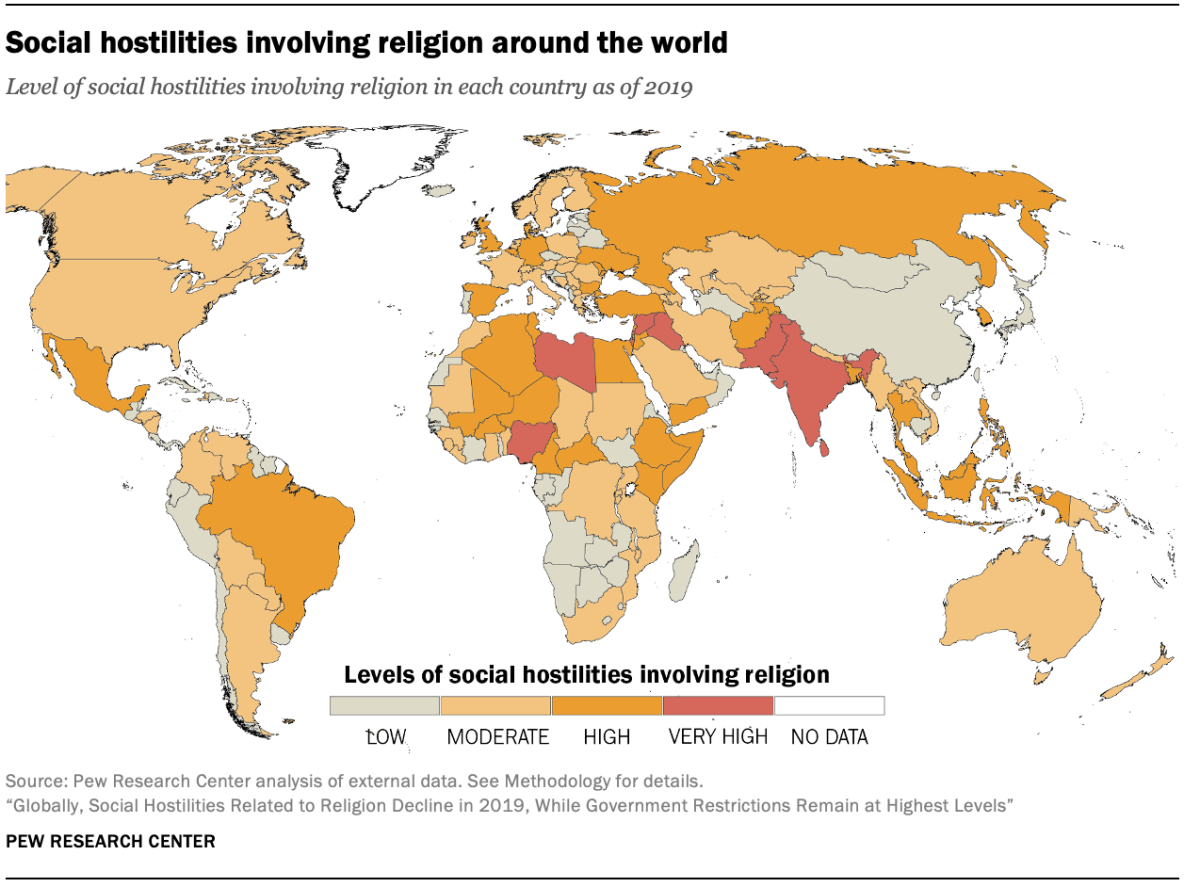 “Nothing short of a thunderbolt striking York Minster [cathedral] can stop the consecration of the bishop of Durham taking place.…” So said Richard Harries, dean of London’s King’s College, during a BBC Radio talk.Harries was referring to the appointment of David Jenkins as the Church of England’s fourth most-senior bishop. A former Oxford don, Jenkins’s doubts concerning basic Christian beliefs had been widely covered in the British media.Much to Harries’s astonishment, lightning did strike York Minster—England’s largest medieval cathedral—but it was three days too late to prevent Jenkins’s consecration. Fire caused by the lightning gutted the cathedral’s 750-year-old south transept. Some speculated that the fire might signify God’s hand of judgment at work.The 59-year-old Jenkins was a little-known professor of theology when he was chosen in March to succeed John Habgood as bishop of Durham. But within six weeks he was making national headlines. The controversy began when he was questioned about the divinity of Christ on a national television program. He told an interviewer that he was “pretty clear” that the Virgin Birth was “a story told after the event in order to express and symbolize a faith that this Jesus was a unique event from God.”In addition, he said the Resurrection was not a miracle. “It doesn’t seem to me that there was any one event which you could identify with the Resurrection.” He said Jesus’ miracles do not represent “the literal truth today,” nor was it necessary for a Christian to believe that Jesus was God made flesh.Those assertions outraged many in the Church of England, especially in its Anglo-Catholic and evangelical wings. A petition signed by 12,500 churchgoers urged the archbishop of York to withhold Jenkins’s consecration if he declined to affirm publicly the creeds “as the church has consistently interpreted them.” A number of leading churchmen called for the consecration to be delayed until the appointment had been discussed by the church’s general synod.Two weeks before the consecration, the TV program that first aired Jenkins’s doubts polled 31 Anglican bishops to see how closely their views matched his. The result sounded fresh alarms for the church’s growing evangelical constituency.Nine of the bishops sided with Jenkins on the Resurrection, 10 on the Virgin Birth, and 15 on miracles. Nineteen agreed with him that Christians did not need to believe that Jesus was God made flesh. A public opinion poll commissioned by the TV program indicated that 78 percent of regular churchgoers and 52 percent of all those questioned believed Jesus was the Son of God.Robert Runcie, archbishop of Canterbury and primate of all England, identified with the traditionalists. “It won’t do for us as Christians simply to think of the stories about Jesus as beautiful or helpful or meaningful,” he said. “It won’t do for us to strain out of the stories all that we find difficult because it has an element of miracle and mystery about it.”Evangelical pressure groups, slow to respond initially, have begun rallying the faithful. An Essex clergyman sent letters to all 11,000 Anglican clergy to solicit their support for a campaign against liberal theology and permissive morality in the church. He received more than 1,000 supportive replies.As for Jenkins, now bishop of Durham, he stands by his televised assertions. However, he insists that he accepts the divinity of Christ and believes in the Resurrection “as Saint Paul believed in it.”JOHN CAPONin LondonU.S. Says ‘No’ To Overseas Abortion FundingU.S. delegates to the International Conference on Population, held in Mexico City last month, presented a policy statement staunchly opposed to the use of government funds for abortions overseas. “The United States does not consider abortion an acceptable element of family planning programs and will no longer contribute to those of which it is a part,” the paper said.This shift in government policy will affect private organizations, such as International Planned Parenthood Federation, and it requires nations that support abortion to segregate U.S. aid into separate accounts. International Planned Parenthood could lose one-fifth of its budget, or million per year, if it does not change its proabortion policies.The first International Conference on Population met in Bucharest in 1974 and strongly endorsed governmental family planning measures to curb population growth. Reagan administration spokesmen say these efforts must be balanced with an emphasis on spurring economic growth overseas because prosperity results in lower population growth.“Our primary objective,” said the policy paper, “will be to encourage developing countries to adopt sound economic policies and, where appropriate, population policies consistent with respect for human dignity and family values.“Attempts to use abortion, involuntary sterilization, or other coercive measures in family planning must be shunned.”Four U.S. congressmen who oppose abortion pressured the administration to issue a firm policy statement. Reps. Christopher H. Smith (R-N.J.), Jack Kemp (R-N.Y.), Henry Hyde (R-Ill.), and Vin Weber (R-Minn.) met with While House chief of staff James Baker to urge a permanent separation of abortion funding from population programs.Smith, head of the congressional prolife caucus, vigorously opposes the well-documented use of coerced abortions and female infanticide in China. He was particularly alarmed about the United Nations Fund for Population Activities (UNFPA), sponsor of the Mexico City conference,because of its four-year, million grant to the Chinese government’s population control program. UNFPA receives millions of American aid dollars.Organizations that promote abortion as a family-planning alternative call the new administration policy “a significant setback.” They may challenge it in Congress by encouraging prochoice representatives to try to legislate a repeal of the strictures on funding.North American SceneThe U.S. Supreme Court has ruled unconstitutional a Maryland law that limited the fund-raising costs of charities. The law sought to forbid fund raisers from charging charities a fee totaling more than 25 percent of contributions raised. The court’s majority opinion said the law operated on the “mistaken premise that high solicitation costs are an accurate measure of fraud.”A federal judge has ruled against municipal sponsorship of a Michigan nativity scene because it promoted only one set of beliefs. The U.S. Supreme Court earlier upheld a nativity display on public property in Pawtucket, Rhode Island. However, U.S. District Judge Anna Diggs Taylor noted that the Pawtucket display included secular holiday symbols. She ruled that the Birmingham, Michigan, nativity scene was strictly religious.A number of proabortion and feminist organizations are urging President Reagan to denounce violence against abortion clinics. The National Abortion Federation, whose Washington, D.C., headquarters were damaged by a bomb blast in July, reports that 10 clinics have been bombed or damaged by arson this year.A group of Methodist clergymen and the American Jewish Congress are challenging a federal program designed to discourage adolescent sexual activity. Filed through the American Civil Liberties Union, the suit argues that the Adolescent Family Life Program promotes religious teachings in violation of the First Amendment. Under the law, the government has distributed more than million to hospitals, universities, social service agencies, and religious organizations.The U.S. Army is using a version of theFocus on the Familyfilm series to help provide positive role models for soldiers and their spouses. Christian author James Dobson, whose organization produced the film series, is a member of the army’s Task Force on Soldiers and Families.An association of 51 Southern Baptist churches in North Carolina has taken its denomination to task for adopting an antitobacco resolution. Southern Baptist Convention messengers (delegates) in June urged Congress to terminate subsidies to tobacco farmers and encouraged Southern Baptists who grow tobacco to switch to another crop. A recent resolution adopted by the Johnson Baptist Association in North Carolina calls the crop “the lifeline for many of our people and the majority of the churches” in the association.The science education program at Liberty Baptist College has gained the approval of Virginia’s state board of education.Last year the program won conditional approval after a battle over whether Liberty graduates would teach creationism. College chancellor Jerry Falwell had sparked the dispute by saying Liberty graduates would teach evolution only to show that it is “foolish.” Recently, a committee appointed by the state board of education found the college’s biology curriculum to be scientifically sound.A Washington, D.C., newspaper owned by Sun Myung Moon’s Unification Church has fired its editor and publisher. Officials at the Washington Times said James Whelan had made outrageous contract demands, including a salary increase from ,000 to 5,000 by 1989, a rent-free 0,000 house, and a new luxury car every two years. Whelan charged that Moon’s church had assumed direct control of the newspaper. The Unification Church has pumped 0 million into the two-year-old operation to keep it alive.A group of religious radio stations and a music licensing agency have resolved more than seven years of litigation. U.S. District Judge Whitman Knapp approved a settlement between some 75 radio stations and the American Society of Composers, Authors and Publishers (ASCAP). The stations had challenged the method ASCAP uses to charge fees to radio stations that broadcast music licensed by ASCAP. The settlement provides for a judge to determine reasonable fees when religious radio stations and ASCAP fail to agree on terms for licenses.
“Nothing short of a thunderbolt striking York Minster [cathedral] can stop the consecration of the bishop of Durham taking place.…” So said Richard Harries, dean of London’s King’s College, during a BBC Radio talk.Harries was referring to the appointment of David Jenkins as the Church of England’s fourth most-senior bishop. A former Oxford don, Jenkins’s doubts concerning basic Christian beliefs had been widely covered in the British media.Much to Harries’s astonishment, lightning did strike York Minster—England’s largest medieval cathedral—but it was three days too late to prevent Jenkins’s consecration. Fire caused by the lightning gutted the cathedral’s 750-year-old south transept. Some speculated that the fire might signify God’s hand of judgment at work.The 59-year-old Jenkins was a little-known professor of theology when he was chosen in March to succeed John Habgood as bishop of Durham. But within six weeks he was making national headlines. The controversy began when he was questioned about the divinity of Christ on a national television program. He told an interviewer that he was “pretty clear” that the Virgin Birth was “a story told after the event in order to express and symbolize a faith that this Jesus was a unique event from God.”In addition, he said the Resurrection was not a miracle. “It doesn’t seem to me that there was any one event which you could identify with the Resurrection.” He said Jesus’ miracles do not represent “the literal truth today,” nor was it necessary for a Christian to believe that Jesus was God made flesh.Those assertions outraged many in the Church of England, especially in its Anglo-Catholic and evangelical wings. A petition signed by 12,500 churchgoers urged the archbishop of York to withhold Jenkins’s consecration if he declined to affirm publicly the creeds “as the church has consistently interpreted them.” A number of leading churchmen called for the consecration to be delayed until the appointment had been discussed by the church’s general synod.Two weeks before the consecration, the TV program that first aired Jenkins’s doubts polled 31 Anglican bishops to see how closely their views matched his. The result sounded fresh alarms for the church’s growing evangelical constituency.Nine of the bishops sided with Jenkins on the Resurrection, 10 on the Virgin Birth, and 15 on miracles. Nineteen agreed with him that Christians did not need to believe that Jesus was God made flesh. A public opinion poll commissioned by the TV program indicated that 78 percent of regular churchgoers and 52 percent of all those questioned believed Jesus was the Son of God.Robert Runcie, archbishop of Canterbury and primate of all England, identified with the traditionalists. “It won’t do for us as Christians simply to think of the stories about Jesus as beautiful or helpful or meaningful,” he said. “It won’t do for us to strain out of the stories all that we find difficult because it has an element of miracle and mystery about it.”Evangelical pressure groups, slow to respond initially, have begun rallying the faithful. An Essex clergyman sent letters to all 11,000 Anglican clergy to solicit their support for a campaign against liberal theology and permissive morality in the church. He received more than 1,000 supportive replies.As for Jenkins, now bishop of Durham, he stands by his televised assertions. However, he insists that he accepts the divinity of Christ and believes in the Resurrection “as Saint Paul believed in it.”JOHN CAPONin LondonU.S. Says ‘No’ To Overseas Abortion FundingU.S. delegates to the International Conference on Population, held in Mexico City last month, presented a policy statement staunchly opposed to the use of government funds for abortions overseas. “The United States does not consider abortion an acceptable element of family planning programs and will no longer contribute to those of which it is a part,” the paper said.This shift in government policy will affect private organizations, such as International Planned Parenthood Federation, and it requires nations that support abortion to segregate U.S. aid into separate accounts. International Planned Parenthood could lose one-fifth of its budget, or million per year, if it does not change its proabortion policies.The first International Conference on Population met in Bucharest in 1974 and strongly endorsed governmental family planning measures to curb population growth. Reagan administration spokesmen say these efforts must be balanced with an emphasis on spurring economic growth overseas because prosperity results in lower population growth.“Our primary objective,” said the policy paper, “will be to encourage developing countries to adopt sound economic policies and, where appropriate, population policies consistent with respect for human dignity and family values.“Attempts to use abortion, involuntary sterilization, or other coercive measures in family planning must be shunned.”Four U.S. congressmen who oppose abortion pressured the administration to issue a firm policy statement. Reps. Christopher H. Smith (R-N.J.), Jack Kemp (R-N.Y.), Henry Hyde (R-Ill.), and Vin Weber (R-Minn.) met with While House chief of staff James Baker to urge a permanent separation of abortion funding from population programs.Smith, head of the congressional prolife caucus, vigorously opposes the well-documented use of coerced abortions and female infanticide in China. He was particularly alarmed about the United Nations Fund for Population Activities (UNFPA), sponsor of the Mexico City conference,because of its four-year, million grant to the Chinese government’s population control program. UNFPA receives millions of American aid dollars.Organizations that promote abortion as a family-planning alternative call the new administration policy “a significant setback.” They may challenge it in Congress by encouraging prochoice representatives to try to legislate a repeal of the strictures on funding.North American SceneThe U.S. Supreme Court has ruled unconstitutional a Maryland law that limited the fund-raising costs of charities. The law sought to forbid fund raisers from charging charities a fee totaling more than 25 percent of contributions raised. The court’s majority opinion said the law operated on the “mistaken premise that high solicitation costs are an accurate measure of fraud.”A federal judge has ruled against municipal sponsorship of a Michigan nativity scene because it promoted only one set of beliefs. The U.S. Supreme Court earlier upheld a nativity display on public property in Pawtucket, Rhode Island. However, U.S. District Judge Anna Diggs Taylor noted that the Pawtucket display included secular holiday symbols. She ruled that the Birmingham, Michigan, nativity scene was strictly religious.A number of proabortion and feminist organizations are urging President Reagan to denounce violence against abortion clinics. The National Abortion Federation, whose Washington, D.C., headquarters were damaged by a bomb blast in July, reports that 10 clinics have been bombed or damaged by arson this year.A group of Methodist clergymen and the American Jewish Congress are challenging a federal program designed to discourage adolescent sexual activity. Filed through the American Civil Liberties Union, the suit argues that the Adolescent Family Life Program promotes religious teachings in violation of the First Amendment. Under the law, the government has distributed more than million to hospitals, universities, social service agencies, and religious organizations.The U.S. Army is using a version of theFocus on the Familyfilm series to help provide positive role models for soldiers and their spouses. Christian author James Dobson, whose organization produced the film series, is a member of the army’s Task Force on Soldiers and Families.An association of 51 Southern Baptist churches in North Carolina has taken its denomination to task for adopting an antitobacco resolution. Southern Baptist Convention messengers (delegates) in June urged Congress to terminate subsidies to tobacco farmers and encouraged Southern Baptists who grow tobacco to switch to another crop. A recent resolution adopted by the Johnson Baptist Association in North Carolina calls the crop “the lifeline for many of our people and the majority of the churches” in the association.The science education program at Liberty Baptist College has gained the approval of Virginia’s state board of education.Last year the program won conditional approval after a battle over whether Liberty graduates would teach creationism. College chancellor Jerry Falwell had sparked the dispute by saying Liberty graduates would teach evolution only to show that it is “foolish.” Recently, a committee appointed by the state board of education found the college’s biology curriculum to be scientifically sound.A Washington, D.C., newspaper owned by Sun Myung Moon’s Unification Church has fired its editor and publisher. Officials at the Washington Times said James Whelan had made outrageous contract demands, including a salary increase from ,000 to 5,000 by 1989, a rent-free 0,000 house, and a new luxury car every two years. Whelan charged that Moon’s church had assumed direct control of the newspaper. The Unification Church has pumped 0 million into the two-year-old operation to keep it alive.A group of religious radio stations and a music licensing agency have resolved more than seven years of litigation. U.S. District Judge Whitman Knapp approved a settlement between some 75 radio stations and the American Society of Composers, Authors and Publishers (ASCAP). The stations had challenged the method ASCAP uses to charge fees to radio stations that broadcast music licensed by ASCAP. The settlement provides for a judge to determine reasonable fees when religious radio stations and ASCAP fail to agree on terms for licenses.Pew highlighted declines in five of the 13 measures of its Social Hostilities Index.
Religion-related terrorism (including “deaths, physical abuse, displacement, detentions, destruction of property, and fundraising and recruitment by terrorist groups”) was recorded in 49 nations—a record low, down from 64 the prior year and from a high of 82 in 2014 (which led the US State Department to declare terrorism as the persecuted church’s biggest threat). In sub-Saharan Africa the number of countries experiencing religious terrorism stayed stable, in all other regions the tally dropped.
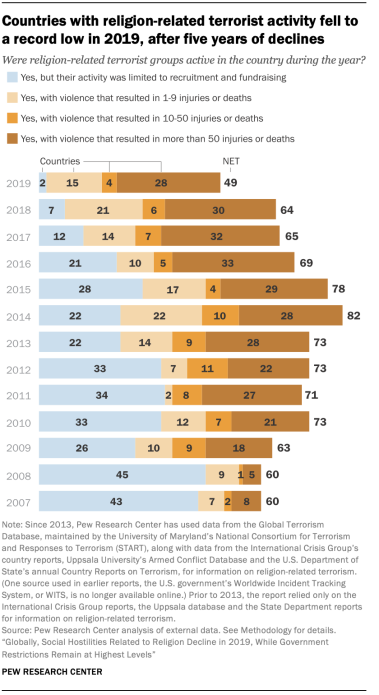
However, 28 nations did experience terrorist violence resulting in more than 50 injuries or deaths—a grim tally that has stayed relatively stable since 2013. When the report began in 2007, fewer than 10 nations suffered the same.
Pew highlighted Sri Lanka as the worst example in 2019. Over 250 people were killed and 500 injured during an ISIS-affiliated series of bombings at churches and hotels on Easter Sunday. But Afghanistan was also noted, for attacks carried out by the Taliban.
Mob violence was recorded in 34 nations, down from 41. And social hostilities stemming from proselytism were recorded in 28 nations, down from 35.
Efforts to enforce a dominant religion or religious norms also declined. Group hostility was recorded in 94 nations, down from 104, and individual hostility in 74 nations, down from 85.
Bolivia was highlighted, as unlike the year before there were no reports of Protestant missionaries expelled from rural areas by practitioners of indigenous belief. And in Egypt, while violence toward Christians continued, there were fewer abductions and displacements reported, leading to a reduction of social hostilities from “very high” to “high.”
Pew also tallied the type of force or violence inflicted around the world. Property damage (occurring in 59% of nations), physical assaults (in 40%), detentions (in 35%), killings (in 24%), and displacement (in 19%) were ranked from most to least common.
Again, regional differences were apparent: the Middle East and North Africa scored 3.8; Europe scored 2.1; Asia-Pacific scored 1.9; Sub-Saharan Africa scored 1.7; and the Americas scored 0.7. Only Europe ticked upward. In Denmark, Pew noted, vandals destroyed over 80 tombstones in a Jewish cemetery on the anniversary of a 1938 pogrom.
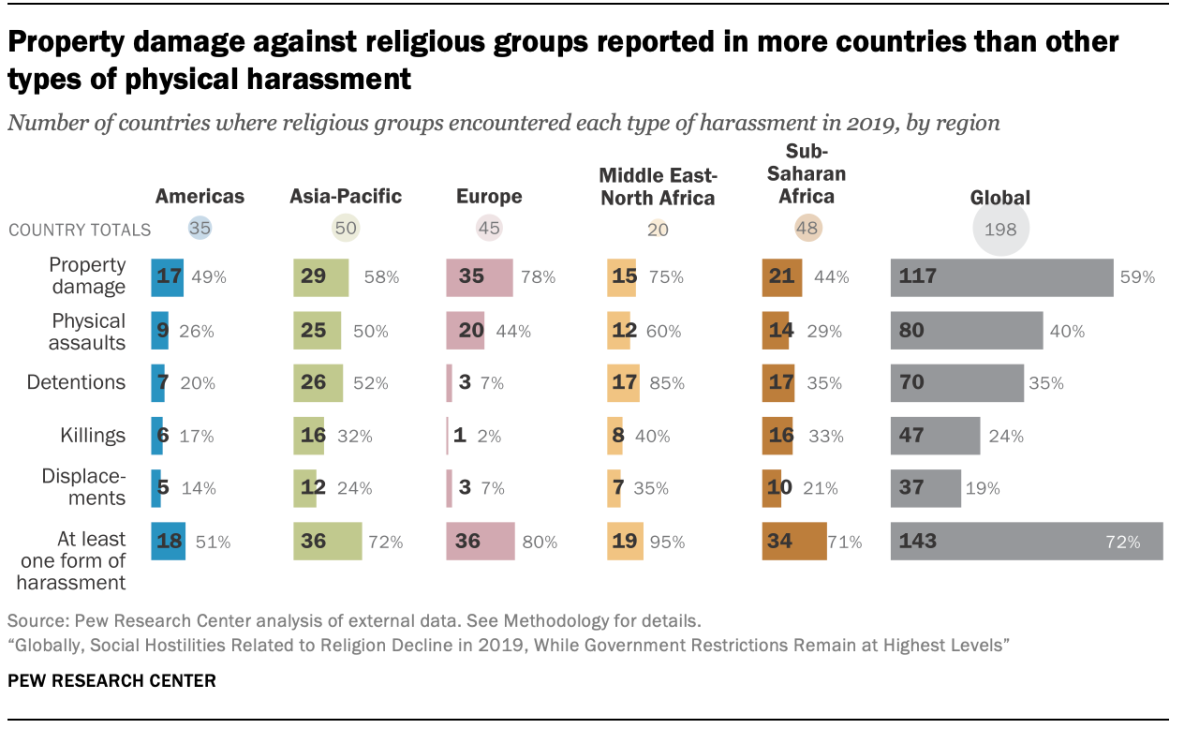 However, a federal appeals court bars a Bible club from meeting in a Pennsylvania school.Equal-access legislation, ardently supported by almost all evangelical and mainline church organizations, has become federal law. It prevents public secondary schools from disbanding student religious groups that want to meet for prayer, Bible study, or discussions of religion (see related editorial on p. 12).Heartfelt, sometimes rancorous, congressional debate about the measure hinged on a question that ordinarily lies dormant beneath the surface of national consciousness: May individual rights of free speech and assembly cross over the boundary between church and state?In response, the U.S. Senate voiced a resounding yes, voting 88 to 11 in favor of the bill. The U.S. House of Representatives followed suit in July with a 337 to 77 vote. But on the same afternoon the House took its decisive vote, a U.S. Circuit Court of Appeals in Pennsylvania said no. The court overturned an earlier ruling in favor of Williamsport high school students who organized a Bible club called Petros.To protect groups like Petros, the Equal Access Act makes it unlawful for any public secondary school to discriminate against student groups based on the subject matter they are discussing. It protects “religious, political, philosophical, or other” types of speech rather than singling out only religious speech. The law does not allow nonstudents to “direct, conduct, control, or regularly attend” such meetings.The act does not authorize the government to withold federal financial assistance to schools that do not comply, a provision earlier drafts included. It defines “noninstructional time”—during which extracurricular groups may meet—as occurring before or after the school day begins. It does not specifically prohibit religious meetings during free periods throughout the school day, but court decisions around the country, including the recent Williamsport ruling, have done so.Conservative members of Congress, discontent over compromises in the wording of the act, pushed ahead with proposals for vocal and silent prayer during class time. A measure endorsing silent prayer passed in the House, while a more sweeping proposal failed. The silent-prayer amendment that passed the House stood slim chance of coming up in the Senate, which would have to debate and pass it before it became law.An earlier version of the Equal Access Act failed to pass the House in June after it was blocked by the American Civil Liberties Union (ACLU), National Education Association (NEA), and several Jewish lobby groups (CT, June 15, 1984, p. 58). In the wake of that narrow defeat, Senate sponsor Mark O. Hatfield (R-Oreg.) redoubled his efforts to work out an acceptable compromise.Drafting the bill and nudging it through Congress proved to be a grueling decathlon of unusual procedures, power plays, and negotiation. Hatfield’s staff lawyer Randy Sterns met with strategists from the Christian Legal Society (CLS), National Association of Evangelicals, and Baptist Joint Committee on Public Affairs. They painstakingly weighed and measured the nuances of each phrase troubling the bill’s opponents. Finally, the ACLU declared itself neutral toward the measure, and Hatfield attached it to a bill providing federal funds to upgrade math and science teaching—a program dear to the heart of the NEA. Once the ACLU declared a truce, “that broke the logjam and changed a lot of votes,” Sterns said.Hatfield’s involvement with the issue began in 1981 after a court decision in Lubbock, Texas, prevented a student religious group from meeting at school. In response, Hatfield shaped a coalition of 24 senators who filed an unprecedented friend-of-the-court brief on behalf of the Lubbock students. “We built a strong basis of support from which to introduce this bill,” Sterns said, including 50 cosponsors by the end.After achieving Senate passage, the bill went to the House. It was promptly shelved by House Speaker Thomas P. O’Neill, who sent it to two committees from which he never expected it to emerge. But Democrats who supported the measure threatened to use an obscure confrontational tactic to upstage committee chairmen who tried to block the bill.O’Neill backed down and agreed to suspend the usual rules of debate. That move was necessary to prevent opponents from choking off debate by offering hundreds of meaningless amendments.Opponents voiced fears of cults infiltrating student meetings; of “student-initiated catechism or baptism or other religious services”; and of school districts “inundated by demands from students for religious meetings of various types of cults, fringe groups, and allegedly religious movements.”Throughout the congressional wrangling, equal-access supporters drew attention to the Williamsport case, a classic illustration of the type of discrimination they wanted to remedy. To their relief, the appeals court decision opposing the students came down after Congress approved the Equal Access Act.The appeals court ruling acknowledges the students’ right to free speech and the school’s prerogative to allow clubs to meet in its classrooms. But the court applied a traditional three-part test of whether a religious activity is constitutional, and it gave the Petros club a failing grade because it would have the effect of “advancing” religion under the auspices of the state.The majority said high school students are apt to be immature and impressionable, thus “less able to appreciate the fact that permission for Petros to meet would be granted out of a spirit of neutrality toward religion and not advancement.” Some students may come to believe that the school endorses and encourages religious practice, the decision says, because “involuntary contact between nonparticipating students and religious groups is inevitable.” The club is unconstitutional, according to the court, because “public schools have never been a forum for religious expression.”A strong dissent by one circuit court judge pointed out that Petros is the only club in the school’s history to be denied the right to meet. This “selective exclusion,” he said, raises a more pertinent question: Is the school officially hostile to religion?Sam Ericsson of CLS, lead counsel for the Williamsport students, said he will appeal the case to the U.S. Supreme Court. Because a number of similar lower-court rulings conflict with a two-year-old U.S. Supreme Court decision permitting college students to meet on campus for religious purposes, it is likely that the high court will agree to rule on the Williamsport case.Court decisions have made school officials increasingly wary of allowing student religious groups to meet. But passage of the Equal Access Act trumpets a clear signal that these clubs are legitimate and acceptable. Even so, future court challenges are expected.“We have no sense of smugness about resolving every issue that’s going to come up,” Sterns said. “The particulars will have to be worked out in case-by-case litigation.” Meanwhile, it is up to students, parents, and schools to work out ways to exercise their equal-access rights.U.S. Churches Debate Wide Array Of Issues During Summer MeetingsThe General Board of American Baptist Churches (ABC) has affirmed the competence of Christians to make decisions regarding “covenantal, intentional family arrangements,” an apparent reference to homosexual unions. The board also asked the 1.6-million-member ABC to help strengthen family units of all kinds, including “covenantal family-like groups.”The action came as part of a policy statement on family life approved by the general board at its summer meeting. The statement was adopted by a vote of 140 to 24, with 4 abstentions.One denominational official stressed that the statement upholds an individual’s right to choose, and does not address the morality of all choices. Some board members asked if the reference to “covenantal, intentional family arrangements” could be construed as approving homosexual unions. Robert Chew, a member of the task force that prepared the statement, said it does not condone all family lifestyles. Instead, the statement is a “mandate to ABC churches to minister to every kind of lifestyle that exists,” he said.The statement also says remarriage for divorced Christians is “appropriate where the issues which ended an earlier marriage have been addressed.” However, it affirmed that God intends marriage to be monogamous and lifelong.The general board also urged the U.S. government to reject a military approach to problems in Central America and instead stress assistance in economic development. In addition, the board spent four hours debating American Baptist involvement in ecumenical organizations. At its December meeting, the board will vote on a statement that reaffirms the denomination’s commitment to the National Council of Churches and World Council of Churches.Other major American denominations met during the summer, debating issues from abortion to ordaining women as deacons. Actions taken include the following:• The all-male general synod of the 300,000-member Christian Reformed Church voted 82 to 75 to allow women to be ordained as deacons. The synod gave local congregations the right to decide whether to implement the decision. Women continue to be excluded from the offices of minister, elder, and evangelist.The 160-member synod also declared that theological support for apartheid—South Africa’s ideology of racial segregation—is heresy.• Delegates to the Lutheran Church in America (LCA) convention adopted a statement that says nuclear weapons must not be seen as a permanent deterrent to war. The statement deplored the sale of military arms and expressed alarm at the “proliferation of nuclear weapons.” The delegates, representing three million Lutherans, also condemned foreign military intervention in Central America and asked that U.S. economic aid be withheld from regimes that violate basic human rights.• Delegates representing the Church of the Brethren’s 164,000 members adopted a statement that reiterates its opposition to abortion. In other action, delegates appointed a committee to study and make recommendations on how the historic peace church should respond to the dilemma of paying for war through taxes.• Commissioners to the Presbyterian Church in America (PCA) general assembly voted not to call the mainline Presbyterian Church (USA) “apostate.” The assembly said it did not want to put itself in the position of labeling more liberal church bodies. Commissioners also rejected a proposed study to explore a possible role for women as deacons in the 135,000-member denomination.As the world’s attention was fixed on Olympic athletes striving for the gold, another quieter yet massive effort was taking place. Some 11,000 Christian volunteers from 77 countries were sharing their faith with foreign visitors and Los Angeles-area residents.The evangelistic outreach—sprawling over an 80-mile radius surrounding the Olympic competition—was assisted by 1,800 area churches. Campus Crusade for Christ, Messengers International, the International Church of the Foursquare Gospel, Youth With a Mission, and 10 other major organizations recruited volunteers. Participants served without pay, and were responsible to cover their living expenses during the effort. Some were housed by Christians in the area, while others lived in churches, schools, or missions.Several methods of evangelism were used, from one-on-one conversations to dramatic and musical presentations. Drama and music were employed in more than a thousand outreach sites, including stages set up near Olympic athletes’ villages. Singers such as Debby Boone, Andraé Crouch, and Donna Summer, and 150 groups, performed 700 hours of gospel music.Much of the Christian witness was focused on the athletes’ villages. The U.S. Track and Field Team contained 60 professing Christians among its 120 members. Some of these, including gold medalist Carl Lewis, gave public testimonies of their faith at an event organized by Laywitnesses for Christ International. Several Christian athletes sacrificed thousands of dollars in promotional fees from athletic clothing manufacturers by choosing to wear Christian T-shirts at public events.Volunteers witnessed to international visitors on the streets. The mayor of Paris expressed surprise at the numbers of Christians he saw engaged in evangelism. Egyptians involved in the outreach focused on Arabs, giving Bibles to athletes from Muslim countries that are difficult to penetrate with missionary activity.On Hollywood Boulevard, Christian groups performed on a stage set up near massage parlors and pornographic movie theaters. Other groups witnessed in Los Angeles’s many ethnic neighborhoods.A Fijian group called Island Review was warmly received in black and Hispanic areas. At one performance in an inner-city park, 20 gang members stepped forward to acknowledge Christ as their Savior.Olympics outreach chairman John Dawson estimates that during the Summer Games, at least 1,000 persons a day made decisions to follow Christ.JANICE ROGERS
However, a federal appeals court bars a Bible club from meeting in a Pennsylvania school.Equal-access legislation, ardently supported by almost all evangelical and mainline church organizations, has become federal law. It prevents public secondary schools from disbanding student religious groups that want to meet for prayer, Bible study, or discussions of religion (see related editorial on p. 12).Heartfelt, sometimes rancorous, congressional debate about the measure hinged on a question that ordinarily lies dormant beneath the surface of national consciousness: May individual rights of free speech and assembly cross over the boundary between church and state?In response, the U.S. Senate voiced a resounding yes, voting 88 to 11 in favor of the bill. The U.S. House of Representatives followed suit in July with a 337 to 77 vote. But on the same afternoon the House took its decisive vote, a U.S. Circuit Court of Appeals in Pennsylvania said no. The court overturned an earlier ruling in favor of Williamsport high school students who organized a Bible club called Petros.To protect groups like Petros, the Equal Access Act makes it unlawful for any public secondary school to discriminate against student groups based on the subject matter they are discussing. It protects “religious, political, philosophical, or other” types of speech rather than singling out only religious speech. The law does not allow nonstudents to “direct, conduct, control, or regularly attend” such meetings.The act does not authorize the government to withold federal financial assistance to schools that do not comply, a provision earlier drafts included. It defines “noninstructional time”—during which extracurricular groups may meet—as occurring before or after the school day begins. It does not specifically prohibit religious meetings during free periods throughout the school day, but court decisions around the country, including the recent Williamsport ruling, have done so.Conservative members of Congress, discontent over compromises in the wording of the act, pushed ahead with proposals for vocal and silent prayer during class time. A measure endorsing silent prayer passed in the House, while a more sweeping proposal failed. The silent-prayer amendment that passed the House stood slim chance of coming up in the Senate, which would have to debate and pass it before it became law.An earlier version of the Equal Access Act failed to pass the House in June after it was blocked by the American Civil Liberties Union (ACLU), National Education Association (NEA), and several Jewish lobby groups (CT, June 15, 1984, p. 58). In the wake of that narrow defeat, Senate sponsor Mark O. Hatfield (R-Oreg.) redoubled his efforts to work out an acceptable compromise.Drafting the bill and nudging it through Congress proved to be a grueling decathlon of unusual procedures, power plays, and negotiation. Hatfield’s staff lawyer Randy Sterns met with strategists from the Christian Legal Society (CLS), National Association of Evangelicals, and Baptist Joint Committee on Public Affairs. They painstakingly weighed and measured the nuances of each phrase troubling the bill’s opponents. Finally, the ACLU declared itself neutral toward the measure, and Hatfield attached it to a bill providing federal funds to upgrade math and science teaching—a program dear to the heart of the NEA. Once the ACLU declared a truce, “that broke the logjam and changed a lot of votes,” Sterns said.Hatfield’s involvement with the issue began in 1981 after a court decision in Lubbock, Texas, prevented a student religious group from meeting at school. In response, Hatfield shaped a coalition of 24 senators who filed an unprecedented friend-of-the-court brief on behalf of the Lubbock students. “We built a strong basis of support from which to introduce this bill,” Sterns said, including 50 cosponsors by the end.After achieving Senate passage, the bill went to the House. It was promptly shelved by House Speaker Thomas P. O’Neill, who sent it to two committees from which he never expected it to emerge. But Democrats who supported the measure threatened to use an obscure confrontational tactic to upstage committee chairmen who tried to block the bill.O’Neill backed down and agreed to suspend the usual rules of debate. That move was necessary to prevent opponents from choking off debate by offering hundreds of meaningless amendments.Opponents voiced fears of cults infiltrating student meetings; of “student-initiated catechism or baptism or other religious services”; and of school districts “inundated by demands from students for religious meetings of various types of cults, fringe groups, and allegedly religious movements.”Throughout the congressional wrangling, equal-access supporters drew attention to the Williamsport case, a classic illustration of the type of discrimination they wanted to remedy. To their relief, the appeals court decision opposing the students came down after Congress approved the Equal Access Act.The appeals court ruling acknowledges the students’ right to free speech and the school’s prerogative to allow clubs to meet in its classrooms. But the court applied a traditional three-part test of whether a religious activity is constitutional, and it gave the Petros club a failing grade because it would have the effect of “advancing” religion under the auspices of the state.The majority said high school students are apt to be immature and impressionable, thus “less able to appreciate the fact that permission for Petros to meet would be granted out of a spirit of neutrality toward religion and not advancement.” Some students may come to believe that the school endorses and encourages religious practice, the decision says, because “involuntary contact between nonparticipating students and religious groups is inevitable.” The club is unconstitutional, according to the court, because “public schools have never been a forum for religious expression.”A strong dissent by one circuit court judge pointed out that Petros is the only club in the school’s history to be denied the right to meet. This “selective exclusion,” he said, raises a more pertinent question: Is the school officially hostile to religion?Sam Ericsson of CLS, lead counsel for the Williamsport students, said he will appeal the case to the U.S. Supreme Court. Because a number of similar lower-court rulings conflict with a two-year-old U.S. Supreme Court decision permitting college students to meet on campus for religious purposes, it is likely that the high court will agree to rule on the Williamsport case.Court decisions have made school officials increasingly wary of allowing student religious groups to meet. But passage of the Equal Access Act trumpets a clear signal that these clubs are legitimate and acceptable. Even so, future court challenges are expected.“We have no sense of smugness about resolving every issue that’s going to come up,” Sterns said. “The particulars will have to be worked out in case-by-case litigation.” Meanwhile, it is up to students, parents, and schools to work out ways to exercise their equal-access rights.U.S. Churches Debate Wide Array Of Issues During Summer MeetingsThe General Board of American Baptist Churches (ABC) has affirmed the competence of Christians to make decisions regarding “covenantal, intentional family arrangements,” an apparent reference to homosexual unions. The board also asked the 1.6-million-member ABC to help strengthen family units of all kinds, including “covenantal family-like groups.”The action came as part of a policy statement on family life approved by the general board at its summer meeting. The statement was adopted by a vote of 140 to 24, with 4 abstentions.One denominational official stressed that the statement upholds an individual’s right to choose, and does not address the morality of all choices. Some board members asked if the reference to “covenantal, intentional family arrangements” could be construed as approving homosexual unions. Robert Chew, a member of the task force that prepared the statement, said it does not condone all family lifestyles. Instead, the statement is a “mandate to ABC churches to minister to every kind of lifestyle that exists,” he said.The statement also says remarriage for divorced Christians is “appropriate where the issues which ended an earlier marriage have been addressed.” However, it affirmed that God intends marriage to be monogamous and lifelong.The general board also urged the U.S. government to reject a military approach to problems in Central America and instead stress assistance in economic development. In addition, the board spent four hours debating American Baptist involvement in ecumenical organizations. At its December meeting, the board will vote on a statement that reaffirms the denomination’s commitment to the National Council of Churches and World Council of Churches.Other major American denominations met during the summer, debating issues from abortion to ordaining women as deacons. Actions taken include the following:• The all-male general synod of the 300,000-member Christian Reformed Church voted 82 to 75 to allow women to be ordained as deacons. The synod gave local congregations the right to decide whether to implement the decision. Women continue to be excluded from the offices of minister, elder, and evangelist.The 160-member synod also declared that theological support for apartheid—South Africa’s ideology of racial segregation—is heresy.• Delegates to the Lutheran Church in America (LCA) convention adopted a statement that says nuclear weapons must not be seen as a permanent deterrent to war. The statement deplored the sale of military arms and expressed alarm at the “proliferation of nuclear weapons.” The delegates, representing three million Lutherans, also condemned foreign military intervention in Central America and asked that U.S. economic aid be withheld from regimes that violate basic human rights.• Delegates representing the Church of the Brethren’s 164,000 members adopted a statement that reiterates its opposition to abortion. In other action, delegates appointed a committee to study and make recommendations on how the historic peace church should respond to the dilemma of paying for war through taxes.• Commissioners to the Presbyterian Church in America (PCA) general assembly voted not to call the mainline Presbyterian Church (USA) “apostate.” The assembly said it did not want to put itself in the position of labeling more liberal church bodies. Commissioners also rejected a proposed study to explore a possible role for women as deacons in the 135,000-member denomination.As the world’s attention was fixed on Olympic athletes striving for the gold, another quieter yet massive effort was taking place. Some 11,000 Christian volunteers from 77 countries were sharing their faith with foreign visitors and Los Angeles-area residents.The evangelistic outreach—sprawling over an 80-mile radius surrounding the Olympic competition—was assisted by 1,800 area churches. Campus Crusade for Christ, Messengers International, the International Church of the Foursquare Gospel, Youth With a Mission, and 10 other major organizations recruited volunteers. Participants served without pay, and were responsible to cover their living expenses during the effort. Some were housed by Christians in the area, while others lived in churches, schools, or missions.Several methods of evangelism were used, from one-on-one conversations to dramatic and musical presentations. Drama and music were employed in more than a thousand outreach sites, including stages set up near Olympic athletes’ villages. Singers such as Debby Boone, Andraé Crouch, and Donna Summer, and 150 groups, performed 700 hours of gospel music.Much of the Christian witness was focused on the athletes’ villages. The U.S. Track and Field Team contained 60 professing Christians among its 120 members. Some of these, including gold medalist Carl Lewis, gave public testimonies of their faith at an event organized by Laywitnesses for Christ International. Several Christian athletes sacrificed thousands of dollars in promotional fees from athletic clothing manufacturers by choosing to wear Christian T-shirts at public events.Volunteers witnessed to international visitors on the streets. The mayor of Paris expressed surprise at the numbers of Christians he saw engaged in evangelism. Egyptians involved in the outreach focused on Arabs, giving Bibles to athletes from Muslim countries that are difficult to penetrate with missionary activity.On Hollywood Boulevard, Christian groups performed on a stage set up near massage parlors and pornographic movie theaters. Other groups witnessed in Los Angeles’s many ethnic neighborhoods.A Fijian group called Island Review was warmly received in black and Hispanic areas. At one performance in an inner-city park, 20 gang members stepped forward to acknowledge Christ as their Savior.Olympics outreach chairman John Dawson estimates that during the Summer Games, at least 1,000 persons a day made decisions to follow Christ.JANICE ROGERSThe number of nations scoring “very high” levels of social hostilities also decreased, from 10 to 8, the lowest tally in over a decade. The Central African Republic and Egypt were removed from the list.
Overall, there was more variance in social hostilities year-over-year than in government restrictions. “Modest” increases in score of 1.0 or more were recorded in 10 countries, while 32 declined similarly. One nation—Burkina Faso—scored a “large” increase of 2.0 or more, while Armenia, Greece, Kyrgyzstan, Malaysia, and Romania declined by the same amount.
Christians and Muslims remain the religious groups receiving harassment most widely. The number of nations harassing Christians increased from 145 to 153, while the nations harassing Muslims increased from 139 to 147. Jews, harassed in 89 nations (up from 88), were the only group to receive more pressure from society than from government.
An “other” category of Baha'is, Sikhs, and Zoroastrians followed, harassed in 68 nations, followed by folk religions in 32. Violations against Buddhists (in 25), Hindus (in 21), and an “unaffiliated” category of atheists, agnostics, and humanists (in 22) were less widespread.
In addition to a tally of nations, Pew also organized data to measure the impact of restrictions and hostilities on a wide scope of humanity. Among the 25 largest nations—representing 75 percent of the world population—Egypt, India, Pakistan, Nigeria, and Russia recorded the highest overall levels. Japan, the Democratic Republic of Congo, South Africa, Italy, and the United States ranked lowest.
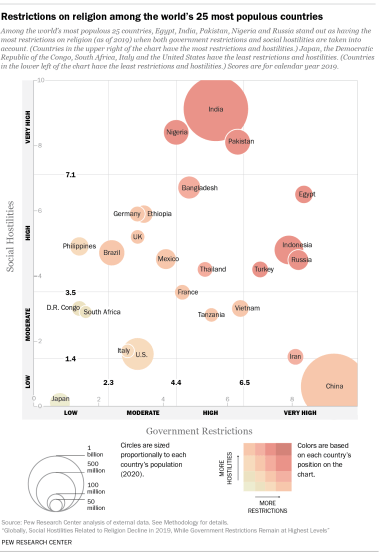 Porn opponents call for a boycott of 7-Eleven, a leading retailer of sexually explicit magazines.Pornography was put on center stage when former Miss America Vanessa Williams was dethroned after Penthouse magazine published sexually explicit photos of her. The National Federation for Decency (NFD) is working hard to keep the porn issue in the spotlight.Last month the group organized a nationwide, one-day picket of 7-Eleven, the convenience store leader. Demonstrators showed up at more than 400 7-Eleven stores in some 150 cities. The NFD says 7-Eleven leads the nation in retailing pornographic magazines. A 7-Eleven spokesman says the charge can neither be conclusively confirmed nor disproved.The NFD also has urged a boycott of the convenience-store chain until it changes its policies on porn retailing. The organization says its efforts already are netting results. A number of retail chains, other than 7-Eleven, have discontinued the objectionable magazines, says NFD associate director Steve Hallman. Handy Marts Corporation, which owns 78 7-Eleven stores, has pulled the magazines on a two-month test basis.There are almost 7,400 7-Eleven stores in the United States. Most are owned and operated by the multi-billion dollar Southland Corporation, based in Dallas. Doug Reed, Southland’s media relations coordinator, says there will be no changes in his company’s policy on porn retailing. That policy allows for the sale of just three “men’s” magazines—Playboy, Penthouse, and Forum. These are covered with blinders that allow only the titles to show, and they are not advertised.However, independent franchisees own 35 percent of the nation’s 7-Eleven stores. Some openly display as many as 60 pornographic magazines. Reed says Southland urges compliance with corporation policy on the sale of such magazines, but has no legal control over independent owners.“We consider ourselves a public-minded corporation,” he says. “We don’t want to offend anyone, but we recognize that [the magazines] are products some people request. We are not in the position to make moral judgments for our customers.”The antipornography movement has embraced a boycott strategy partly because of perceived lax enforcement of laws regulating the pornography industry. Most states have enacted some form of antiobscenity laws. In addition, federal laws prohibit the shipping, mailing, and importation of obscene material.However, it can be difficult to determine what is obscene. The U.S. Supreme Court in Miller v. California (1973) defined obscenity in terms of what an “average person” would find “patently offensive” by applying “contemporary adult community standards.” For guilt to be established, someone must initiate legal proceedings against each violation.When a case does go to court, defense lawyers—heavily subsidized by the pornography industry—are often able to outmanuever prosecutors. Paul McCommon, legal counsel for Citizens for Decency through Law, says the current system, with its heavy emphasis on civil rights, favors pornographers. He adds that most authorities have not taken the initiative to prosecute and punish violators.Meanwhile, the pornography industry burgeons. Some analysts say it does billion worth of business annually. Accurate figures are hard to come by since some segments operate underground. “The pervasiveness of the problem increases every day,” McCommon says. “This is easily observable based on what’s available on cable TV, at video stores, corner stores, and gas stations.”The conviction that pornography degrades women has drawn feminists into the fray. City councils in Minneapolis and Indianapolis have passed bills that would outlaw pornography as a violation of women’s rights. (The Minneapolis measure was vetoed by the city’s mayor. The Indianapolis ordinance is being challenged in court.)The chairman of the Playboy Foundation, Burt Joseph, claims there is no connection between reading sexually explicit material and criminal behavior, such as rape. “The studies show that it’s the violence, not the sex, that causes antisocial conduct,” he says. Playboy does not publish photographs dealing with violence and refuses to accept advertising for guns, he says.Joseph, who does not consider Playboy to be pornographic, theorizes that censors and pornographers need each other to keep their trades alive. “Only when pornography is suppressed,” he says, “does it continue to have a market interest. If people wanted to stamp out pornography, they should let it proliferate, and it would lead to boredom.” Critics call Joseph’s solution naïve and his evaluation of Playboy inaccurate. Both those who agree and disagree with him cite studies to support their views.Not only has the pornography industry expanded, but its tone has changed markedly in recent years. Thirty years ago, when Playboy was alone in the field, pornography consisted of pictures of nude women. But Playboy, now considered relatively tame, has lost a large segment of the market. It now has 4.1 million subscribers, down from 7.2 million in its peak year of 1972. In many magazines, today’s pornography includes depictions of sadomasochism, rape, bestiality, and urination. In addition, some porn monitors estimate that more than 200 pornographic magazines exploit children. Some are published for profit; others serve a subculture of pedophiles.Pornography’s turn toward the violent, bizarre, and grotesque has given rise to sociological and psychological analyses of the problem. Robert Moore, a professor of psychology and religion at Chicago Theological Seminary, says people who have been deprived of loving relationships early in life are prime candidates for psychological addiction to pornography.Jean Bethke Elshtain, a University of Massachusetts professor of political science, writes in The New Republic that the porn plague mirrors “a world in which human beings … see themselves as objects of social forces over which they have no control.” She says pornography offers the viewer the illusion of “unlimited power to bend others to his will.”
Porn opponents call for a boycott of 7-Eleven, a leading retailer of sexually explicit magazines.Pornography was put on center stage when former Miss America Vanessa Williams was dethroned after Penthouse magazine published sexually explicit photos of her. The National Federation for Decency (NFD) is working hard to keep the porn issue in the spotlight.Last month the group organized a nationwide, one-day picket of 7-Eleven, the convenience store leader. Demonstrators showed up at more than 400 7-Eleven stores in some 150 cities. The NFD says 7-Eleven leads the nation in retailing pornographic magazines. A 7-Eleven spokesman says the charge can neither be conclusively confirmed nor disproved.The NFD also has urged a boycott of the convenience-store chain until it changes its policies on porn retailing. The organization says its efforts already are netting results. A number of retail chains, other than 7-Eleven, have discontinued the objectionable magazines, says NFD associate director Steve Hallman. Handy Marts Corporation, which owns 78 7-Eleven stores, has pulled the magazines on a two-month test basis.There are almost 7,400 7-Eleven stores in the United States. Most are owned and operated by the multi-billion dollar Southland Corporation, based in Dallas. Doug Reed, Southland’s media relations coordinator, says there will be no changes in his company’s policy on porn retailing. That policy allows for the sale of just three “men’s” magazines—Playboy, Penthouse, and Forum. These are covered with blinders that allow only the titles to show, and they are not advertised.However, independent franchisees own 35 percent of the nation’s 7-Eleven stores. Some openly display as many as 60 pornographic magazines. Reed says Southland urges compliance with corporation policy on the sale of such magazines, but has no legal control over independent owners.“We consider ourselves a public-minded corporation,” he says. “We don’t want to offend anyone, but we recognize that [the magazines] are products some people request. We are not in the position to make moral judgments for our customers.”The antipornography movement has embraced a boycott strategy partly because of perceived lax enforcement of laws regulating the pornography industry. Most states have enacted some form of antiobscenity laws. In addition, federal laws prohibit the shipping, mailing, and importation of obscene material.However, it can be difficult to determine what is obscene. The U.S. Supreme Court in Miller v. California (1973) defined obscenity in terms of what an “average person” would find “patently offensive” by applying “contemporary adult community standards.” For guilt to be established, someone must initiate legal proceedings against each violation.When a case does go to court, defense lawyers—heavily subsidized by the pornography industry—are often able to outmanuever prosecutors. Paul McCommon, legal counsel for Citizens for Decency through Law, says the current system, with its heavy emphasis on civil rights, favors pornographers. He adds that most authorities have not taken the initiative to prosecute and punish violators.Meanwhile, the pornography industry burgeons. Some analysts say it does billion worth of business annually. Accurate figures are hard to come by since some segments operate underground. “The pervasiveness of the problem increases every day,” McCommon says. “This is easily observable based on what’s available on cable TV, at video stores, corner stores, and gas stations.”The conviction that pornography degrades women has drawn feminists into the fray. City councils in Minneapolis and Indianapolis have passed bills that would outlaw pornography as a violation of women’s rights. (The Minneapolis measure was vetoed by the city’s mayor. The Indianapolis ordinance is being challenged in court.)The chairman of the Playboy Foundation, Burt Joseph, claims there is no connection between reading sexually explicit material and criminal behavior, such as rape. “The studies show that it’s the violence, not the sex, that causes antisocial conduct,” he says. Playboy does not publish photographs dealing with violence and refuses to accept advertising for guns, he says.Joseph, who does not consider Playboy to be pornographic, theorizes that censors and pornographers need each other to keep their trades alive. “Only when pornography is suppressed,” he says, “does it continue to have a market interest. If people wanted to stamp out pornography, they should let it proliferate, and it would lead to boredom.” Critics call Joseph’s solution naïve and his evaluation of Playboy inaccurate. Both those who agree and disagree with him cite studies to support their views.Not only has the pornography industry expanded, but its tone has changed markedly in recent years. Thirty years ago, when Playboy was alone in the field, pornography consisted of pictures of nude women. But Playboy, now considered relatively tame, has lost a large segment of the market. It now has 4.1 million subscribers, down from 7.2 million in its peak year of 1972. In many magazines, today’s pornography includes depictions of sadomasochism, rape, bestiality, and urination. In addition, some porn monitors estimate that more than 200 pornographic magazines exploit children. Some are published for profit; others serve a subculture of pedophiles.Pornography’s turn toward the violent, bizarre, and grotesque has given rise to sociological and psychological analyses of the problem. Robert Moore, a professor of psychology and religion at Chicago Theological Seminary, says people who have been deprived of loving relationships early in life are prime candidates for psychological addiction to pornography.Jean Bethke Elshtain, a University of Massachusetts professor of political science, writes in The New Republic that the porn plague mirrors “a world in which human beings … see themselves as objects of social forces over which they have no control.” She says pornography offers the viewer the illusion of “unlimited power to bend others to his will.”If measuring just government restrictions, China, Iran, and Indonesia join Egypt and Russia with the highest scores. If measuring just social hostilities, then Bangladesh replaces Russia in the grouping.
Only China and Japan score “low” levels of social hostility, however. The United States, while lowest overall among the 25 most populous nations, is ranked along with Iran and Italy as “moderate.”
Grading took place on a scale. The top 5 percent of nations in each index are categorized as “very high,” while the next 15 percent are “high.” The following 20 percent are categorized as “moderate,” while the remaining 60 percent are “low.”
“Terrorism and war can have huge direct and indirect effects on religious groups, including destroying religious sites, displacing whole communities and inflaming sectarian passions,” Pew researchers noted. “Accordingly, [Pew] tallied the number, location and consequences of religion-related terrorism and armed conflict around the world, as reported in the same primary and secondary sources used to document other forms of intimidation and violence. However, war and terrorism are sufficiently complex that it is not always possible to determine the degree to which they are religiously motivated or state sponsored.”
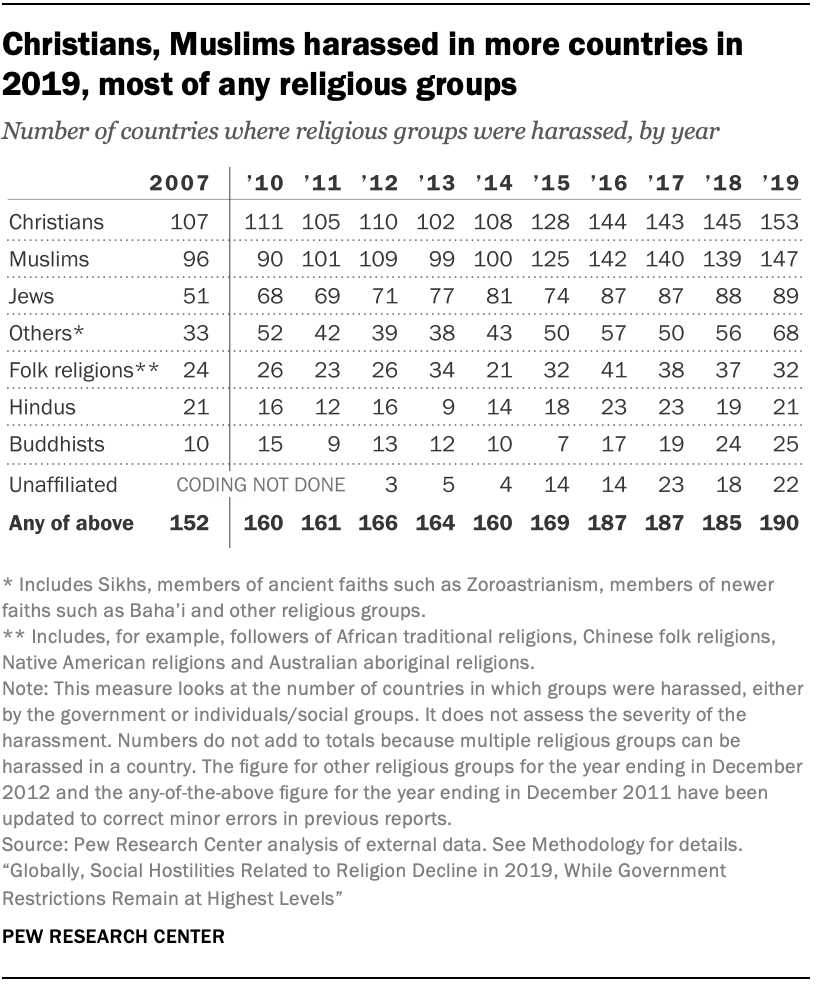
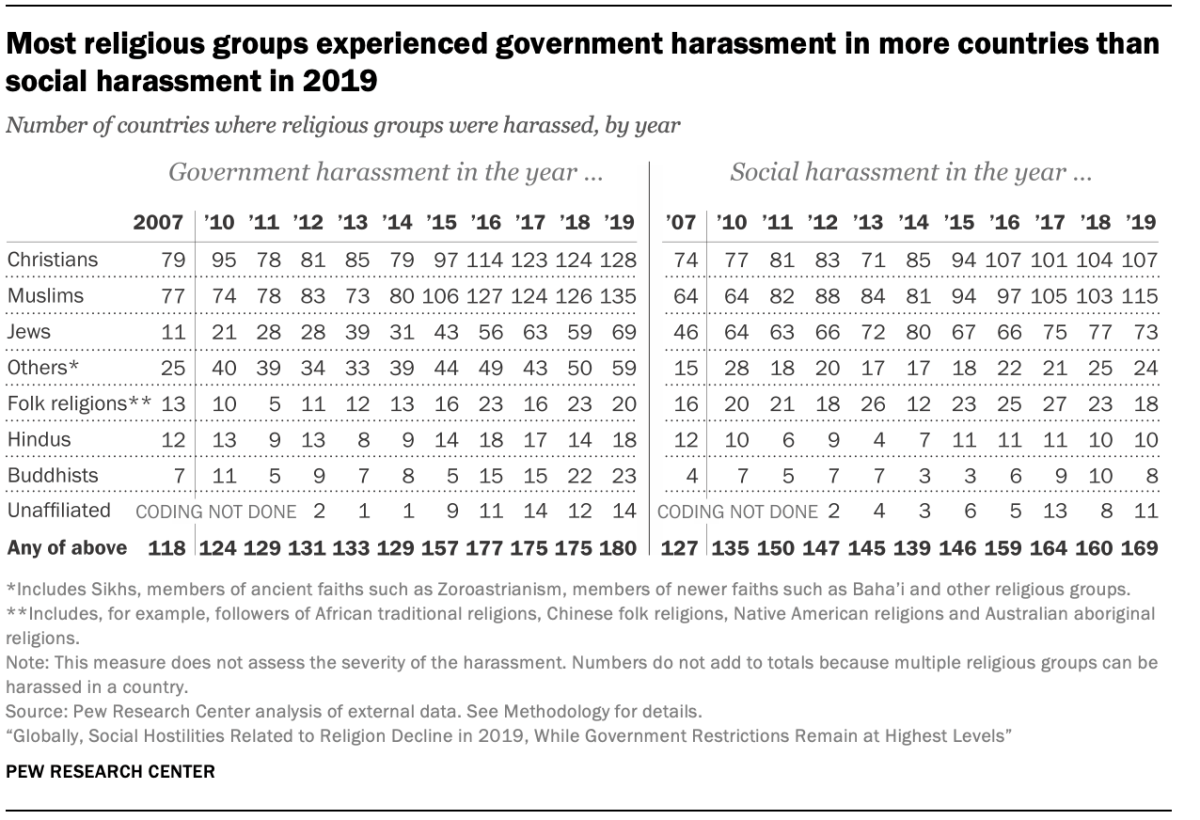 “Nothing short of a thunderbolt striking York Minster [cathedral] can stop the consecration of the bishop of Durham taking place.…” So said Richard Harries, dean of London’s King’s College, during a BBC Radio talk.Harries was referring to the appointment of David Jenkins as the Church of England’s fourth most-senior bishop. A former Oxford don, Jenkins’s doubts concerning basic Christian beliefs had been widely covered in the British media.Much to Harries’s astonishment, lightning did strike York Minster—England’s largest medieval cathedral—but it was three days too late to prevent Jenkins’s consecration. Fire caused by the lightning gutted the cathedral’s 750-year-old south transept. Some speculated that the fire might signify God’s hand of judgment at work.The 59-year-old Jenkins was a little-known professor of theology when he was chosen in March to succeed John Habgood as bishop of Durham. But within six weeks he was making national headlines. The controversy began when he was questioned about the divinity of Christ on a national television program. He told an interviewer that he was “pretty clear” that the Virgin Birth was “a story told after the event in order to express and symbolize a faith that this Jesus was a unique event from God.”In addition, he said the Resurrection was not a miracle. “It doesn’t seem to me that there was any one event which you could identify with the Resurrection.” He said Jesus’ miracles do not represent “the literal truth today,” nor was it necessary for a Christian to believe that Jesus was God made flesh.Those assertions outraged many in the Church of England, especially in its Anglo-Catholic and evangelical wings. A petition signed by 12,500 churchgoers urged the archbishop of York to withhold Jenkins’s consecration if he declined to affirm publicly the creeds “as the church has consistently interpreted them.” A number of leading churchmen called for the consecration to be delayed until the appointment had been discussed by the church’s general synod.Two weeks before the consecration, the TV program that first aired Jenkins’s doubts polled 31 Anglican bishops to see how closely their views matched his. The result sounded fresh alarms for the church’s growing evangelical constituency.Nine of the bishops sided with Jenkins on the Resurrection, 10 on the Virgin Birth, and 15 on miracles. Nineteen agreed with him that Christians did not need to believe that Jesus was God made flesh. A public opinion poll commissioned by the TV program indicated that 78 percent of regular churchgoers and 52 percent of all those questioned believed Jesus was the Son of God.Robert Runcie, archbishop of Canterbury and primate of all England, identified with the traditionalists. “It won’t do for us as Christians simply to think of the stories about Jesus as beautiful or helpful or meaningful,” he said. “It won’t do for us to strain out of the stories all that we find difficult because it has an element of miracle and mystery about it.”Evangelical pressure groups, slow to respond initially, have begun rallying the faithful. An Essex clergyman sent letters to all 11,000 Anglican clergy to solicit their support for a campaign against liberal theology and permissive morality in the church. He received more than 1,000 supportive replies.As for Jenkins, now bishop of Durham, he stands by his televised assertions. However, he insists that he accepts the divinity of Christ and believes in the Resurrection “as Saint Paul believed in it.”JOHN CAPONin LondonU.S. Says ‘No’ To Overseas Abortion FundingU.S. delegates to the International Conference on Population, held in Mexico City last month, presented a policy statement staunchly opposed to the use of government funds for abortions overseas. “The United States does not consider abortion an acceptable element of family planning programs and will no longer contribute to those of which it is a part,” the paper said.This shift in government policy will affect private organizations, such as International Planned Parenthood Federation, and it requires nations that support abortion to segregate U.S. aid into separate accounts. International Planned Parenthood could lose one-fifth of its budget, or million per year, if it does not change its proabortion policies.The first International Conference on Population met in Bucharest in 1974 and strongly endorsed governmental family planning measures to curb population growth. Reagan administration spokesmen say these efforts must be balanced with an emphasis on spurring economic growth overseas because prosperity results in lower population growth.“Our primary objective,” said the policy paper, “will be to encourage developing countries to adopt sound economic policies and, where appropriate, population policies consistent with respect for human dignity and family values.“Attempts to use abortion, involuntary sterilization, or other coercive measures in family planning must be shunned.”Four U.S. congressmen who oppose abortion pressured the administration to issue a firm policy statement. Reps. Christopher H. Smith (R-N.J.), Jack Kemp (R-N.Y.), Henry Hyde (R-Ill.), and Vin Weber (R-Minn.) met with While House chief of staff James Baker to urge a permanent separation of abortion funding from population programs.Smith, head of the congressional prolife caucus, vigorously opposes the well-documented use of coerced abortions and female infanticide in China. He was particularly alarmed about the United Nations Fund for Population Activities (UNFPA), sponsor of the Mexico City conference,because of its four-year, million grant to the Chinese government’s population control program. UNFPA receives millions of American aid dollars.Organizations that promote abortion as a family-planning alternative call the new administration policy “a significant setback.” They may challenge it in Congress by encouraging prochoice representatives to try to legislate a repeal of the strictures on funding.North American SceneThe U.S. Supreme Court has ruled unconstitutional a Maryland law that limited the fund-raising costs of charities. The law sought to forbid fund raisers from charging charities a fee totaling more than 25 percent of contributions raised. The court’s majority opinion said the law operated on the “mistaken premise that high solicitation costs are an accurate measure of fraud.”A federal judge has ruled against municipal sponsorship of a Michigan nativity scene because it promoted only one set of beliefs. The U.S. Supreme Court earlier upheld a nativity display on public property in Pawtucket, Rhode Island. However, U.S. District Judge Anna Diggs Taylor noted that the Pawtucket display included secular holiday symbols. She ruled that the Birmingham, Michigan, nativity scene was strictly religious.A number of proabortion and feminist organizations are urging President Reagan to denounce violence against abortion clinics. The National Abortion Federation, whose Washington, D.C., headquarters were damaged by a bomb blast in July, reports that 10 clinics have been bombed or damaged by arson this year.A group of Methodist clergymen and the American Jewish Congress are challenging a federal program designed to discourage adolescent sexual activity. Filed through the American Civil Liberties Union, the suit argues that the Adolescent Family Life Program promotes religious teachings in violation of the First Amendment. Under the law, the government has distributed more than million to hospitals, universities, social service agencies, and religious organizations.The U.S. Army is using a version of theFocus on the Familyfilm series to help provide positive role models for soldiers and their spouses. Christian author James Dobson, whose organization produced the film series, is a member of the army’s Task Force on Soldiers and Families.An association of 51 Southern Baptist churches in North Carolina has taken its denomination to task for adopting an antitobacco resolution. Southern Baptist Convention messengers (delegates) in June urged Congress to terminate subsidies to tobacco farmers and encouraged Southern Baptists who grow tobacco to switch to another crop. A recent resolution adopted by the Johnson Baptist Association in North Carolina calls the crop “the lifeline for many of our people and the majority of the churches” in the association.The science education program at Liberty Baptist College has gained the approval of Virginia’s state board of education.Last year the program won conditional approval after a battle over whether Liberty graduates would teach creationism. College chancellor Jerry Falwell had sparked the dispute by saying Liberty graduates would teach evolution only to show that it is “foolish.” Recently, a committee appointed by the state board of education found the college’s biology curriculum to be scientifically sound.A Washington, D.C., newspaper owned by Sun Myung Moon’s Unification Church has fired its editor and publisher. Officials at the Washington Times said James Whelan had made outrageous contract demands, including a salary increase from ,000 to 5,000 by 1989, a rent-free 0,000 house, and a new luxury car every two years. Whelan charged that Moon’s church had assumed direct control of the newspaper. The Unification Church has pumped 0 million into the two-year-old operation to keep it alive.A group of religious radio stations and a music licensing agency have resolved more than seven years of litigation. U.S. District Judge Whitman Knapp approved a settlement between some 75 radio stations and the American Society of Composers, Authors and Publishers (ASCAP). The stations had challenged the method ASCAP uses to charge fees to radio stations that broadcast music licensed by ASCAP. The settlement provides for a judge to determine reasonable fees when religious radio stations and ASCAP fail to agree on terms for licenses.
“Nothing short of a thunderbolt striking York Minster [cathedral] can stop the consecration of the bishop of Durham taking place.…” So said Richard Harries, dean of London’s King’s College, during a BBC Radio talk.Harries was referring to the appointment of David Jenkins as the Church of England’s fourth most-senior bishop. A former Oxford don, Jenkins’s doubts concerning basic Christian beliefs had been widely covered in the British media.Much to Harries’s astonishment, lightning did strike York Minster—England’s largest medieval cathedral—but it was three days too late to prevent Jenkins’s consecration. Fire caused by the lightning gutted the cathedral’s 750-year-old south transept. Some speculated that the fire might signify God’s hand of judgment at work.The 59-year-old Jenkins was a little-known professor of theology when he was chosen in March to succeed John Habgood as bishop of Durham. But within six weeks he was making national headlines. The controversy began when he was questioned about the divinity of Christ on a national television program. He told an interviewer that he was “pretty clear” that the Virgin Birth was “a story told after the event in order to express and symbolize a faith that this Jesus was a unique event from God.”In addition, he said the Resurrection was not a miracle. “It doesn’t seem to me that there was any one event which you could identify with the Resurrection.” He said Jesus’ miracles do not represent “the literal truth today,” nor was it necessary for a Christian to believe that Jesus was God made flesh.Those assertions outraged many in the Church of England, especially in its Anglo-Catholic and evangelical wings. A petition signed by 12,500 churchgoers urged the archbishop of York to withhold Jenkins’s consecration if he declined to affirm publicly the creeds “as the church has consistently interpreted them.” A number of leading churchmen called for the consecration to be delayed until the appointment had been discussed by the church’s general synod.Two weeks before the consecration, the TV program that first aired Jenkins’s doubts polled 31 Anglican bishops to see how closely their views matched his. The result sounded fresh alarms for the church’s growing evangelical constituency.Nine of the bishops sided with Jenkins on the Resurrection, 10 on the Virgin Birth, and 15 on miracles. Nineteen agreed with him that Christians did not need to believe that Jesus was God made flesh. A public opinion poll commissioned by the TV program indicated that 78 percent of regular churchgoers and 52 percent of all those questioned believed Jesus was the Son of God.Robert Runcie, archbishop of Canterbury and primate of all England, identified with the traditionalists. “It won’t do for us as Christians simply to think of the stories about Jesus as beautiful or helpful or meaningful,” he said. “It won’t do for us to strain out of the stories all that we find difficult because it has an element of miracle and mystery about it.”Evangelical pressure groups, slow to respond initially, have begun rallying the faithful. An Essex clergyman sent letters to all 11,000 Anglican clergy to solicit their support for a campaign against liberal theology and permissive morality in the church. He received more than 1,000 supportive replies.As for Jenkins, now bishop of Durham, he stands by his televised assertions. However, he insists that he accepts the divinity of Christ and believes in the Resurrection “as Saint Paul believed in it.”JOHN CAPONin LondonU.S. Says ‘No’ To Overseas Abortion FundingU.S. delegates to the International Conference on Population, held in Mexico City last month, presented a policy statement staunchly opposed to the use of government funds for abortions overseas. “The United States does not consider abortion an acceptable element of family planning programs and will no longer contribute to those of which it is a part,” the paper said.This shift in government policy will affect private organizations, such as International Planned Parenthood Federation, and it requires nations that support abortion to segregate U.S. aid into separate accounts. International Planned Parenthood could lose one-fifth of its budget, or million per year, if it does not change its proabortion policies.The first International Conference on Population met in Bucharest in 1974 and strongly endorsed governmental family planning measures to curb population growth. Reagan administration spokesmen say these efforts must be balanced with an emphasis on spurring economic growth overseas because prosperity results in lower population growth.“Our primary objective,” said the policy paper, “will be to encourage developing countries to adopt sound economic policies and, where appropriate, population policies consistent with respect for human dignity and family values.“Attempts to use abortion, involuntary sterilization, or other coercive measures in family planning must be shunned.”Four U.S. congressmen who oppose abortion pressured the administration to issue a firm policy statement. Reps. Christopher H. Smith (R-N.J.), Jack Kemp (R-N.Y.), Henry Hyde (R-Ill.), and Vin Weber (R-Minn.) met with While House chief of staff James Baker to urge a permanent separation of abortion funding from population programs.Smith, head of the congressional prolife caucus, vigorously opposes the well-documented use of coerced abortions and female infanticide in China. He was particularly alarmed about the United Nations Fund for Population Activities (UNFPA), sponsor of the Mexico City conference,because of its four-year, million grant to the Chinese government’s population control program. UNFPA receives millions of American aid dollars.Organizations that promote abortion as a family-planning alternative call the new administration policy “a significant setback.” They may challenge it in Congress by encouraging prochoice representatives to try to legislate a repeal of the strictures on funding.North American SceneThe U.S. Supreme Court has ruled unconstitutional a Maryland law that limited the fund-raising costs of charities. The law sought to forbid fund raisers from charging charities a fee totaling more than 25 percent of contributions raised. The court’s majority opinion said the law operated on the “mistaken premise that high solicitation costs are an accurate measure of fraud.”A federal judge has ruled against municipal sponsorship of a Michigan nativity scene because it promoted only one set of beliefs. The U.S. Supreme Court earlier upheld a nativity display on public property in Pawtucket, Rhode Island. However, U.S. District Judge Anna Diggs Taylor noted that the Pawtucket display included secular holiday symbols. She ruled that the Birmingham, Michigan, nativity scene was strictly religious.A number of proabortion and feminist organizations are urging President Reagan to denounce violence against abortion clinics. The National Abortion Federation, whose Washington, D.C., headquarters were damaged by a bomb blast in July, reports that 10 clinics have been bombed or damaged by arson this year.A group of Methodist clergymen and the American Jewish Congress are challenging a federal program designed to discourage adolescent sexual activity. Filed through the American Civil Liberties Union, the suit argues that the Adolescent Family Life Program promotes religious teachings in violation of the First Amendment. Under the law, the government has distributed more than million to hospitals, universities, social service agencies, and religious organizations.The U.S. Army is using a version of theFocus on the Familyfilm series to help provide positive role models for soldiers and their spouses. Christian author James Dobson, whose organization produced the film series, is a member of the army’s Task Force on Soldiers and Families.An association of 51 Southern Baptist churches in North Carolina has taken its denomination to task for adopting an antitobacco resolution. Southern Baptist Convention messengers (delegates) in June urged Congress to terminate subsidies to tobacco farmers and encouraged Southern Baptists who grow tobacco to switch to another crop. A recent resolution adopted by the Johnson Baptist Association in North Carolina calls the crop “the lifeline for many of our people and the majority of the churches” in the association.The science education program at Liberty Baptist College has gained the approval of Virginia’s state board of education.Last year the program won conditional approval after a battle over whether Liberty graduates would teach creationism. College chancellor Jerry Falwell had sparked the dispute by saying Liberty graduates would teach evolution only to show that it is “foolish.” Recently, a committee appointed by the state board of education found the college’s biology curriculum to be scientifically sound.A Washington, D.C., newspaper owned by Sun Myung Moon’s Unification Church has fired its editor and publisher. Officials at the Washington Times said James Whelan had made outrageous contract demands, including a salary increase from ,000 to 5,000 by 1989, a rent-free 0,000 house, and a new luxury car every two years. Whelan charged that Moon’s church had assumed direct control of the newspaper. The Unification Church has pumped 0 million into the two-year-old operation to keep it alive.A group of religious radio stations and a music licensing agency have resolved more than seven years of litigation. U.S. District Judge Whitman Knapp approved a settlement between some 75 radio stations and the American Society of Composers, Authors and Publishers (ASCAP). The stations had challenged the method ASCAP uses to charge fees to radio stations that broadcast music licensed by ASCAP. The settlement provides for a judge to determine reasonable fees when religious radio stations and ASCAP fail to agree on terms for licenses.
